Spinna
Interview by Ben Goldfarb aka DJ Scribe | Photos by Eilon Paz
incent Williams, known to the world as DJ Spinna, and I are old friends. I have been lucky enough to work with (and for) him many times over the years. From spinning Brooklyn basement parties together in the ‘90s to all-night mixing sessions at my studio. He has also been something of a record collecting mentor to me, as I’m sure he has been to countless others, directly or indirectly.
In recent years we have seen each other less frequently. A changed NYC DJ culture, traveling, getting older, girlfriends, wives and kids, NYC geography, the internet, and complacency, perhaps, have all played a role. So when Eilon asked me to interview Spinna for Dust & Grooves, I jumped at the opportunity, an opportunity to pick the brain of a respected and legendary colleague as much as an excuse to catch up with an old friend.
This interview took place in two sittings, two months apart, in two different places. For the first session, Eilon and I met Spinna at his home studio in Bed-Stuy Brooklyn where his expansive record collection is stored in the “annex.” That was in May. The second session took place at his primary studio and record library, the Thingamajig Lab, also in Bed-Stuy. This was in late July and this time around, it was just Spinna and me. In the intervening two months, Spinna landed in the hospital with an emergency appendectomy, which took him out of commission for a month and saddled him with huge medical bills. A GoFundMe campaign started by NYC DJ Moe Choi raised close to $70K in just a few days through the generosity of more than 1500 of Spinna’s friends and fans from all around the world. Sitting down with him a few weeks later, I was happy to see that he was mostly healed and back at work, but you could tell he had been shaken, and that he was humbled by the outpouring of generosity and love that had followed.
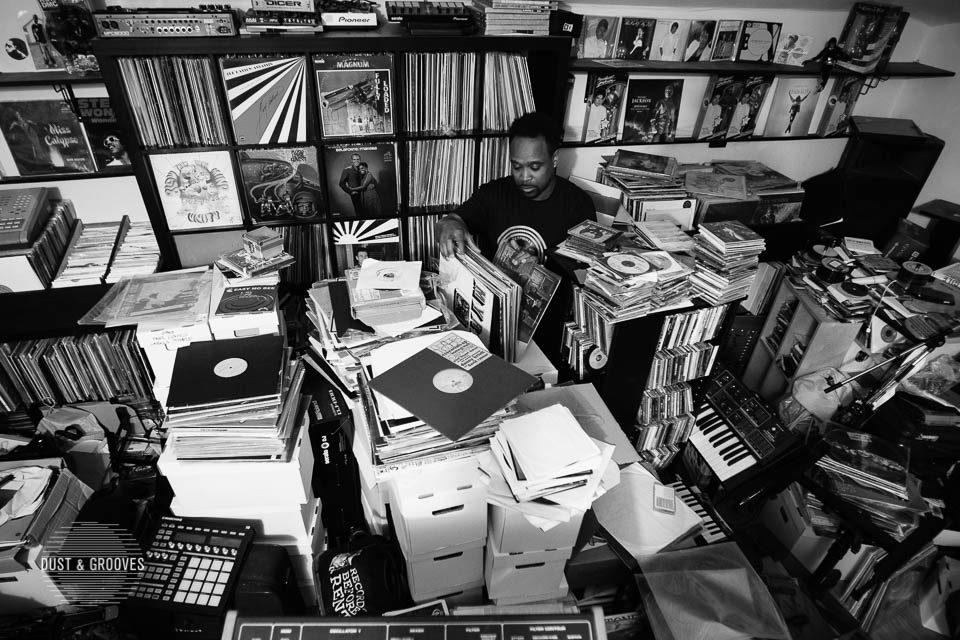
This room gives me both excitement and anxiety.
[laughs] Where does the anxiety come in?
Well, just the idea that there are so many records here, it just seems so inaccessible. Like, how would you ever in your life have time to go through all of this?
Well, that’s another conversation. I have slowed down. I’m still buying. I just bought records yesterday. Still ordering online and whatever. But compared to how I used to be, I’ve slowed down a lot. Because I need to learn my collection. Every single record I pick up, I need to know what it is. It’s been too many years of just buying and stashing, revisit it one day, put it away.
I try to keep Serato to hip-hop style gigs, where I gotta cut records up and stuff. But if I’m just playing eclectic sets, just rocking music, lately I’ve been doing more USB and vinyl. Trying to balance things out between digital and analog… I’ve been on Serato since 2005. The first time I got it I literally bought it, didn’t play with it, and got on a plane and went to Iceland for a gig.
And how did that go?
It went well! ‘At that point, I was at a crossroads. That was when airlines started charging a lot of money for weight, post 2001. It got really expensive to carry crates of records. And tiring. And that was the transition to CDs and CDJs. I still have a gang of CD books. That was annoying. That was the worst maintenance of music that I ever had, because it was a process. Burning the CDs, and you gotta make the labels, and you gotta organize them in the book. Then the CDs started going bad, getting scratched up, and after a while the material would deteriorate.
And if you wanted to add another CD to the book, you had to shift everything ahead.
Yeah! That was horrible. That was just terrible. So by the time Serato came in I was like, YES, let’s go, I’m ready to take on this new thing. But I’m tired of looking at the screen, and I’m at a point where I’m really overwhelmed with so much music in my computer that I forget what things are, what tracks are called, the artists’ names, if they’re not organized in folders, if they’re just in my computer. I get mind blocks while I’m playing. I’m like, what’s the name of the record? And then I’ve had all these misfortunes with hard drives going bad and iTunes files where the tags are removed or files have got no artist names, and then you’re transferring things to another computer…
Oh, damn.
And if I don’t remember the name of the record, I can’t find it because I can’t find it by artist. They’re just lingering. So it’s frustrating. I want to get back to feeling, knowing and seeing what I’m playing. And then the whole vinyl DJing thing has become a new phenomenon with the younger generation. They’re buying records again. And the kids coming out to the clubs, they want to see it, especially in Europe. So, might as well just jump right back in, back to where I come from.
Especially in Europe?
I think here it’s more 45s. 45s are the thing. You can tell by Instagram and everybody showing off their expensive records. Everybody’s an expert now on rare stuff, rare funk and modern funk and deep funk, all this shit. I just posted today before you came here, I don’t know if you saw it, a Men At Work record because I don’t care. [laughs]
Down Under, promo. I’m like, whatever. It’s a fucking $5 record. I love it. Whatever.
Anti-snob
Yeah. I’m gonna keep doing that too. Fifty cent records. Piss somebody off. But overseas I think with people like Sadar and now Ge-Ology’s kinda coming up in the DJ circuit, festivals, and even with house it’s becoming more commonplace for people to experience that. They want to see it more now. Like literally within the past two years, three years, it’s getting popular. It’s dope cuz it’s getting people digging again. And driving the prices of records up…making them disappear.
That’s only good if you’re the one selling.
[laughs] Right?
I’m sure you have some that you could sell.
I’ve gotten rid of some things that I had extras of. The next feat for me, not so much here, cuz most of the stuff in here are records that I bought that I really like and want to keep, but at the other spot… just years and years of wack promos—just gotta get rid of ‘em. And I’ve gotten rid of some last sealed copies of records that I had, a sealed “Check the Rhime.” Couple of sealed “Universal Magnetics.” Stuff that I’ve been holding on to. I’m never gonna open it and I’m never gonna play it, so…just trade it, sell it.
[His custom-built DJ booth is piled high with records.] When was the last time that your booth was, um, playable?
About three years ago! There’s no time. No time, bro, to play around. When I do mixes, I do them in Ableton these days. I think everyone knows I’m a DJ. I did a mix for Resident Advisor recently and I just found out yesterday that there were some comments made like “that dude has all these records…why is he doing this mix in Ableton?” And I’m like, so what? I think I’m entitled to use technology at this point in my life. At the end of the day, it’s about the music, and that goes for quite a few practices in my music/vinyl life, which includes reissues versus original copies of records. If I can’t get an original, I’ll buy a reissue in a heartbeat. It’s taken more precedence now in my brain than ever. Back in the days I’d be like nah, I’ll wait until I find the original. But now it’s like, if the record is that good…
Do you have a stack with the most recent stuff that you bought?
Yup.
Let’s see.
This is while I was in Europe last week. And this stack is from yesterday.
Eilon: So what made you pick this stuff up?
So, ok, let’s see… The Mauskovic Dance Band I found on Bandcamp. I do a lot of digging on Bandcamp as well. I picked up the digital copy on Bandcamp. I wasn’t expecting to see the vinyl in the shop. And even though I have it digitally, I saw the record, and I wanted to have it on vinyl as well. This here is DJ Koze. I have a couple of other records by him, and I was in Berlin playing the club Bergheim, and the DJ who played after me, Joey Anderson, threw on a track by him. So the next day I went digging to see if I could find that track. I think the track he played is on this album, but there’s something else on this album that I like even more than what he played.
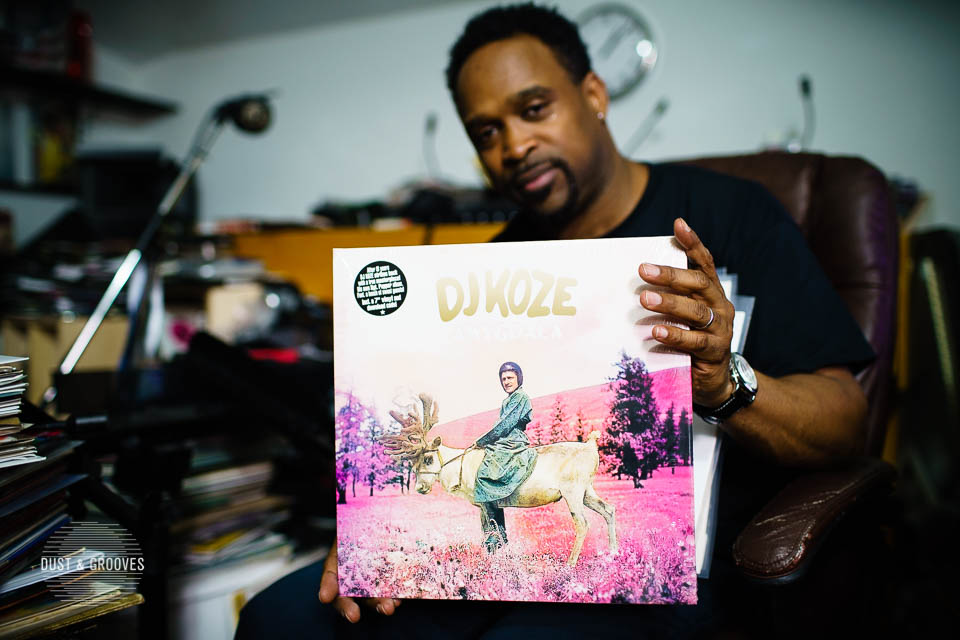 DJ Koze, Amygdala. “I picked this up at HHV in Berlin.
DJ Koze, Amygdala. “I picked this up at HHV in Berlin.
Is that him on the cover?
I doubt it [laughs].
I wouldn’t have guessed from the cover that it was a deep house record.
Right?
These are also new purchases. Tom Misch. He’s dope. [showing flyer] This is my show. I don’t know if you heard about it yet. And I played one of the tracks from this album on the show. Then I did an in-store at Rough Trade the other day and I saw this in there so I had to get it. The track has De La Soul on it. It’s a good record.
What’s the sound?
It’s like, uh, what I call future soul.
What’s the name of your radio show?
DJ Spinna’s Sound Spectrum. It’s on Mixcloud and Podomatic for now. This Guehi Jean is something I picked up at Superfly Records in Paris. ‘80s afro-disco. Heavy.
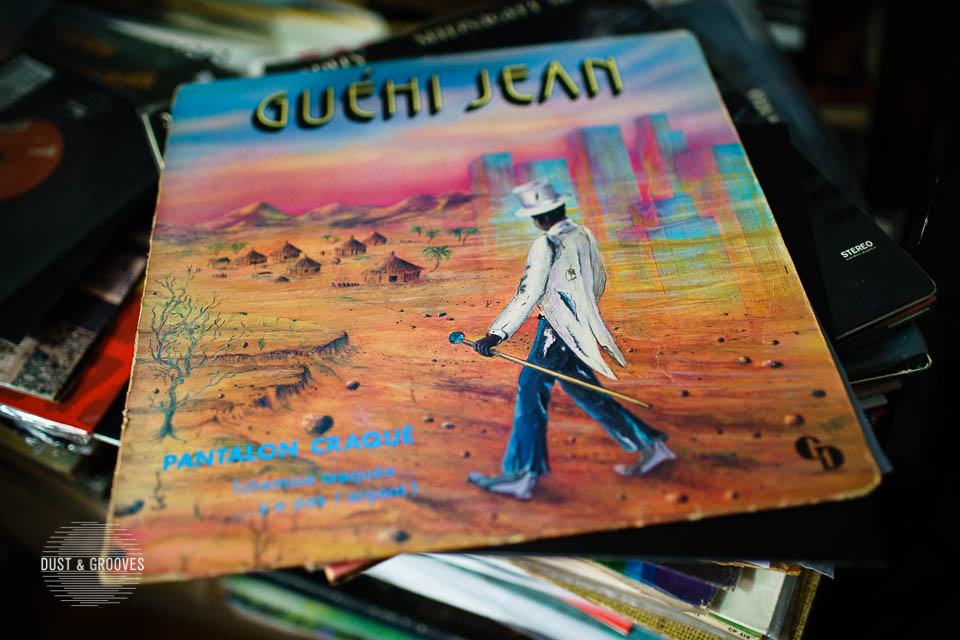
EILON: I have an interview on the site with Manu. One of the first ones, from the first year.
Those guys are great, man. I love ‘em. Picked this [Black Milk, Fever] up yesterday. I’m very selective with my hip-hop vinyl. I have it digitally and I had to get it. And to my surprise it’s pressed at 45rpm. Double vinyl. So that kinda tells me they’re catering more to the vinyl audiophile collectors. It’s really good. Very musical.
What’s crazy about this is that I discovered one of the samples literally weeks before the album came out. I was a little burnt that he used it. But happy at the same time because the vocals are pitched down. The original doesn’t sound like that. It’s a vocal acapella group like Singers Unlimited.
Do you want to say what the samples is?
I will tell you off the record. [laughs].
The design of the cover art is really interesting. It’s like some late ‘80s early ‘90s r&b.
True. Then yesterday after the in-store at Rough Trade I walked over to the Mixtape Shop and picked up a couple things. You been there?
Yeah. Great shop. Love it. What are you looking through now?
Got this K15, this Lone, this “Do You Know Black History” record. Thought it was pretty interesting.
What are some of your favorite places to find records, both in New York and the world?
Heartbeat in Paris. Superfly in Paris. Betino’s in Paris. The flea markets in Paris on Sunday.
In Japan, Lighthouse for new music. Disk Union. Revelation Time in Osaka. Perfect Pitch and Osaka records. There’s a lot of stores in Japan, actually. I just can’t think of all the names. But those are some of the main ones.
Amsterdam…can’t give away too many of my secrets. But Red Light is one of my favorites. Because they specialize in oddball European music. Prog, that kind of thing.
New York is just loaded now. Black Gold, Human Head, Superior Elevation. The Mixtape Shop and Second Hand record shop for new music. Academy. I’ll leave it there. I think that’s enough.
EILON: No old-school spots?
I mean, there are hardly any old-school spots left. I can say A-1 is great for just good DJ records. Like, missing out of your collection, standby, emergency, I need a copy of a popular record…12-inches, hip-hop, house, disco. That kind of thing.
Do you have any sense of how many records you have in your collection at this point?
I think, total, I should be at the 100,000 mark right now. Gotta be. Between 45s and big records, definitely, cuz it’s been my whole life. I’ve been buying forever and I’m still buying like crazy. People send me records. Here alone [at his home studio] I probably have like twenty thousand.
…when I first started getting into digging we were looking for James Brown records, looking for Kool & The Gang and The Meters. A lot of our parents may have listened to them but we wanted them for ourselves. And some of those titles were actually rare. Everything goes in cycles.
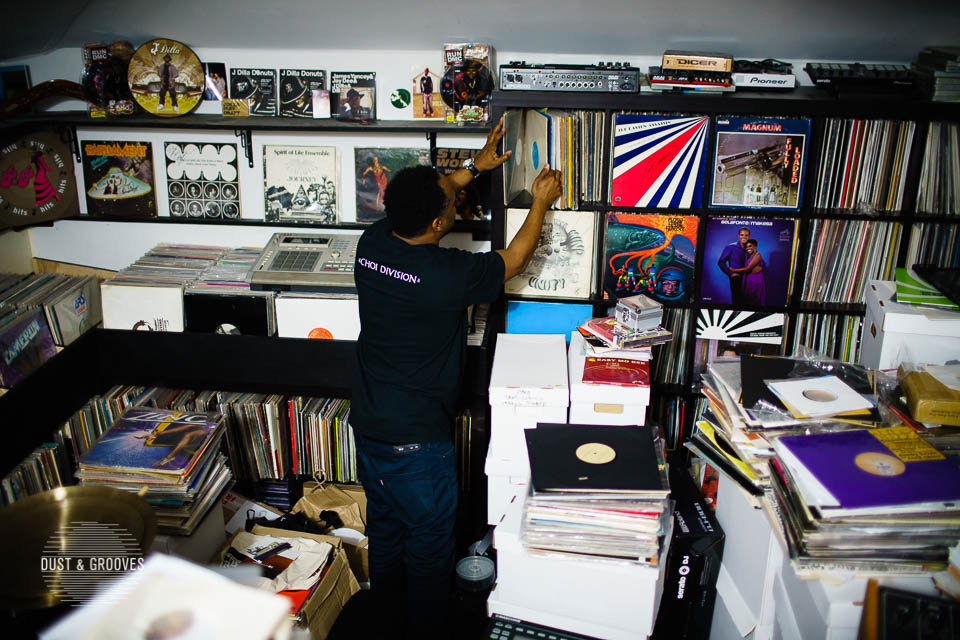
How has the culture of collecting records changed since you started?
The biggest problem is digging online and dealers gouging with prices based on internet sales. I know there are records that should be five, ten dollars in value and those records can be jumped up to fifty to a hundred bucks because some tastemaker DJ blows it up and it becomes the biggest want of collectors. And there’s also a thing where let’s say there’s ten copies of this record on Discogs and they’re five bucks, there are dealers out there that will buy every single copy to make sure that there’s none left so that the value goes up and you can only get the record from them.
Another thing that pisses me off is these trends. I remember when deep funk was the thing in the ‘90s. Now a lot of people have sold those records off because they’re over it, because they want to move on to the next thing. And they started getting into modern funk or modern soul. And then that will die and then house will be the next thing. Actually house is starting to pick up as a collectible genre. So some of these records that I revered and played back in the day are starting to dry up now. Maybe in five, ten years, maybe those records will be higher in price than they originally went for. Things have gotten really trendy. And my stance on it is if you’re a real music lover it shouldn’t matter. If you buy whatever you like, why sell it and get rid of it? To me that means you’re not real about it. I can understand, of course, there’s some records you might want to trade to get something you want more. Not everyone has the space, I get that. But some people look at it as an entire genre I’m done with. I’m getting rid of all of it because I’m bored. That bugs me out. If it’s a good record it’s a good record. It shouldn’t matter what genre it is. I’m like, if I liked it then…I’m gonna keep it.
It’s like, how do you know you’re not going to come back to wanting to play it again? I feel like that happens to me all the time.
Things go in cycles.
There are definitely always people selling the last thing they were into to be able to afford to buy the new thing, though.
I mean, to some degree, I understand that. For example, I’m into gospel at the moment. Apart from the small stash I’ve accumulated over the years I’ve pretty much bypassed that genre for a long time, but there’s a lot of heat out there. At the same time, I’m not getting rid of an entire genre of music to get it. I’m like, give it all to me. I want it all. [laughs] Music is music, man. It shouldn’t be a trendy thing. I’ve never processed it that way.
It’s natural for your tastes to evolve and you can get sick of stuff you play all the time, but I feel like after I let something breathe for a while, then I like it again. It just needs time.
But here’s the other thing. A lot of the records that will go for money are not good. And that’s the thing that bewilders me. Some of these records, there’s a reason why they were dry, and not many copies surfacing to begin with. But because certain DJs play it and they blow it up as this super hard to find thing, it makes people want it more and the value goes up.
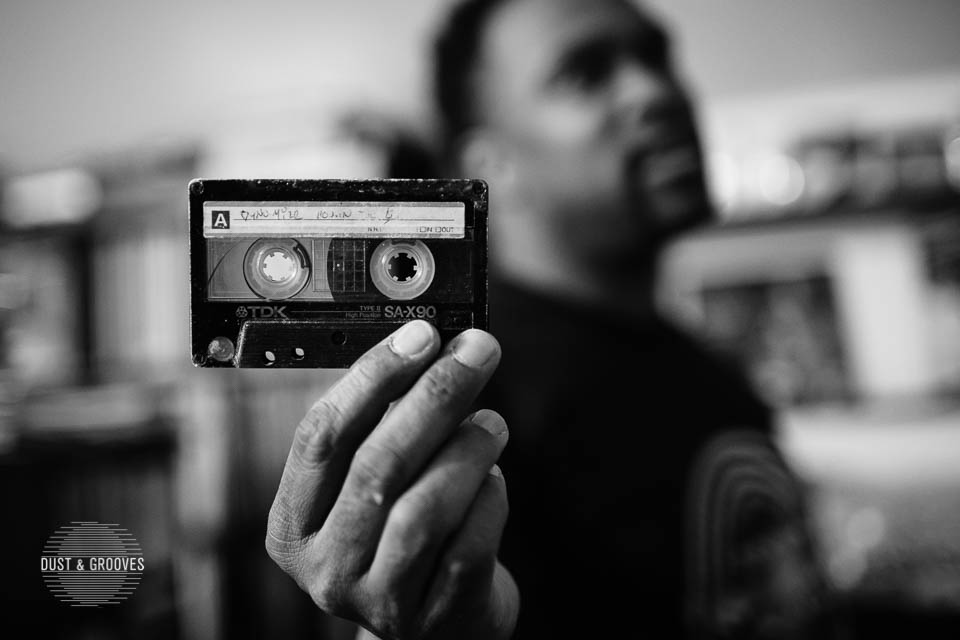 First house mixtape. 1986. One side is better than the other!
First house mixtape. 1986. One side is better than the other!
But not all the trends are caused by people shifting to the new thing. There are new people getting into collecting. It’s a different generation. In the past few years hip-hop albums from the ‘90s and 2000s have become very collectible, whereas the 12-inches, which used to be collectible, are worth nothing. The albums are going for a lot of money, and I think it’s because the people buying are not DJs.
I’m cool with that because when I first started getting into digging we were looking for James Brown records, looking for Kool & The Gang and The Meters. A lot of our parents may have listened to them but we wanted them for ourselves. And some of those titles were actually rare. Everything goes in cycles. Some of these hip-hop albums were hard to get even back then, and now they’re dry and some of them are starting to go for money.
My frustration comes more with the experienced diggers. To me, some of them are phony-balls. [laughs] I can’t ridicule the newcomers. They like what they like. Some may need guidance but some of them are really just true music heads and they want to learn. But they also shouldn’t get got either, and learn the ways of getting records that won’t kill them. The internet has become a very convenient place. But going out in the field and finding a gem for cheap is always so rewarding. Not all of us have the time to dedicate to that, but that’s always going to be the best way to get the record, the hard stuff.
Some of the younger collectors probably don’t even realize that some of the records they’re seeing on Discogs would be cheaper if they found it at a shop somewhere.
Right. And we’re fortunate in New York to have so many stores. In some parts of the country and the world, there aren’t hardly any stores to find these things and the internet is a great place to find it quickly.
Do you remember the first time that you spent a lot of money on a record?
The first expensive record for me was S.O.U.L. It’s not here, it’s at the studio. This was right after Pete Rock and CL Smooth used it. It was forty-five dollars. At that point, I wasn’t spending a lot of money on anything, record-wise. That was the first one.
EILON: Is that a philosophy, not to spend too much money?
No! That’s out the window! I do it a lot less now because I have adult responsibilities but yeah, I still spend. One of those records we listened to earlier was a hundred bucks.
Is there a number in your head where you draw the line, like, no matter what it is you wouldn’t spend it?
Um, kind of, yes. I’d say fifteen hundred. Fifteen hundred is my cap.
That’s a pretty high cap…
Even with that I prefer if it can be paid in installments or part cash, part trade. If I can avoid dropping an entire fifteen hundred in one shot I will. I know a couple of people that would do that but I’d rather not. Unless I want it that bad [laughs]. I really can’t go higher than that. Plus, the record has to be really good, and condition mint. I have to feel like I’m never going to see it again.
I can’t say that I’ve done that very often, man. But there’s records that I bought in the past when I didn’t spend that much that are worth that much now, like the Stark Reality. That’s a thirteen, fifteen hundred dollar record right now, depending on where you get it. I think I paid like three, four when I got it.
I’m nowhere near your echelon of expenditures for records but you probably inspired me to first drop forty dollars on a record when I bought Stevie Wonder, Live at the Talk of the Town, back in the day.
That’s worth it.
Before that I probably hadn’t spent more than twenty dollars on a record. If records were expensive, I was just like, I’ll wait or I’ll pass or whatever.
Yeah. I mean sometimes it’s worth waiting. I just have a phobia of never seeing it again. [laughs] And I know a lot of people that are so lucky… they’re at the right place at the right time and they found incredible records, for nothing. And that happens to me sometimes but not as often as I’d like. Especially now being as busy as I am, I don’t really have time to hit the road and go to some of these dusty obscure places outside of New York.
That’s always the best deal, if you can find it for nothing, of course.
Who were the first DJs that you heard play?
The first DJs that I heard were a combination of people that I had witnessed spinning at local parties, like birthday celebrations, basement parties… In particular there was a mobile DJ crew called Salt and Pepper and they used to do a lot of the Panamanian boat rides I used to go on with my family. And I remember being eight or nine years old, mesmerized, watching them spin. Also, in Brooklyn in the ‘70s, block parties were a big deal. I can’t say that I can recall many of the names of DJs that I saw playing but Salt and Pepper did a block party and I remember their turntables were set up in the back of a van and they were deejaying from that.
Another memory I have is that in the building next to mine there was a DJ set up in the basement. A Puerto Rican brother. And he used to mix live. And to this day I wish I knew what his name was. But I used to peer from the window and watch him do his thing. And then, the guys that inspired me that I would say I was closest to, were on my block. My friend Charles Moore, who would later get me into the Paradise Garage, he had a crew called the Lazer Rock Crew or Lazer Rock Disco. They had a sound system and they would set up on my block in Crown Heights and spin. Their speaker boxes were the shape of a pyramids. Those are a few. Also, Empire roller skating rink. 1980/’81. At the time I didn’t know who was deejaying, but I heard later on that Tee Scott was a resident there. So I’m guessing maybe I caught him, as a kid, in his prime. And radio. 92 KTU, WBLS, daytime mixes, Ted Currier, Tee Scott was on the air, Shep Pettibone Mastermixes on Kiss FM, Tony Humphries, can’t forget him, Merlin Bobb, Timmy Regisford, and John Robinson. These were major influences. I would say that sums it up on that front.
Salt and Pepper, were they playing Panamanian music?
They played salsa, but also disco. Disco was huge during that time. Soul, R&B, disco, along with soca. I would say more Caribbean. Reggae, merengue, and mix it up with whatever the hottest disco records were at the time.
When did you start deejaying?
That question can be answered in a few ways. If you’re asking me when did I start deejaying in my bedroom, learning how to DJ, that would be 1983, so I was twelve.
When I was walking up the ramp, “Ten Percent” by Double Exposure was playing. Those are the memories I have. And when I was leaving the club, getting on the train, it was daylight. Definitely my first experience leaving a party in daylight, on a Sunday afternoon. And riding on the train home, my ears were shot to death. I couldn’t hear anything.
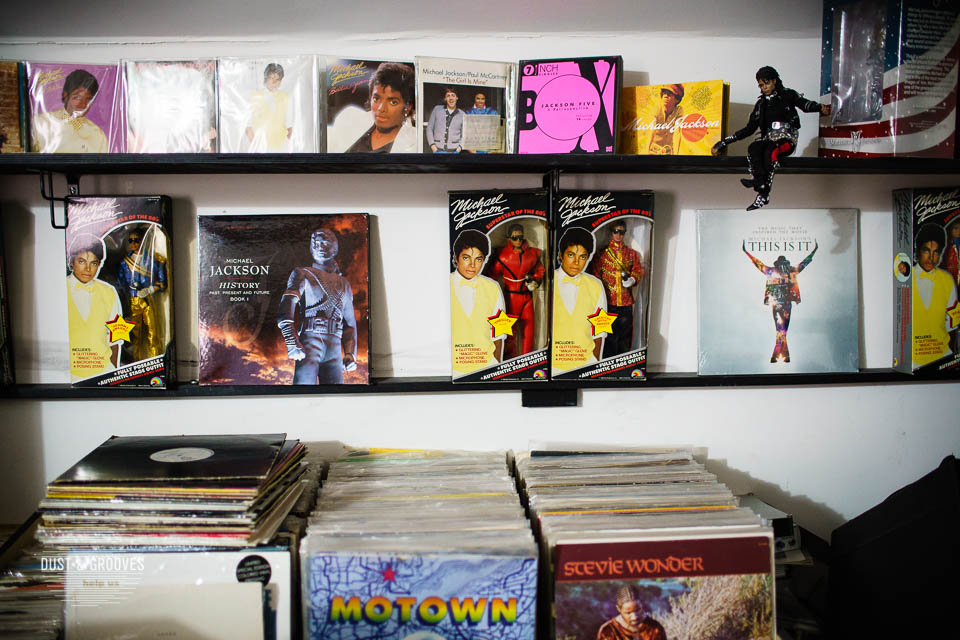
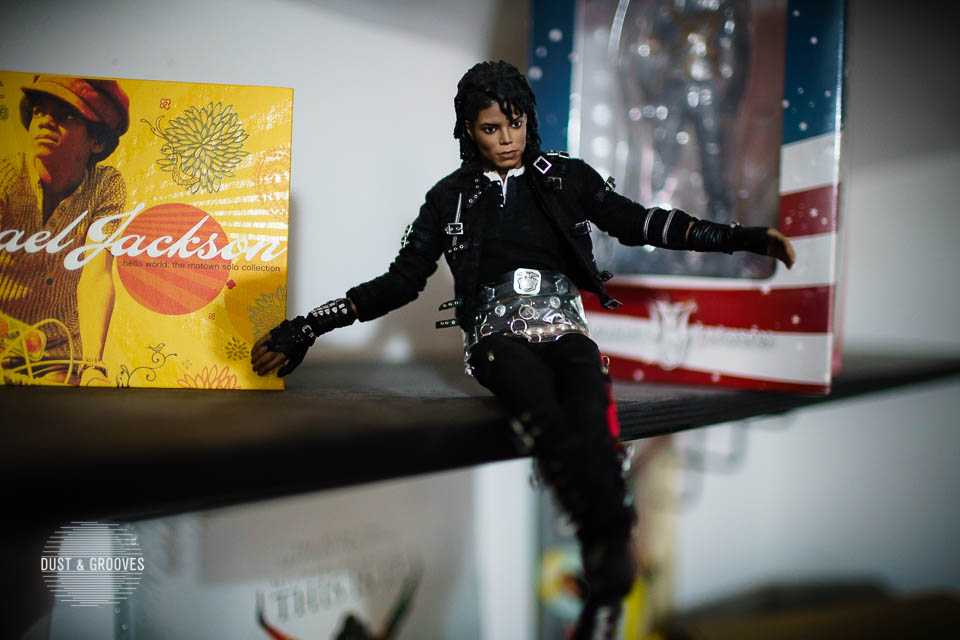 RIP Michael Jackson. My first kiddie hero.
RIP Michael Jackson. My first kiddie hero.
When did you first play a party?
A year later. So, I was thirteen.
Do you remember what you were playing?
That year, that was when records like “Somebody Else’s Guy” were out. “Set It Off” was the hot record. “Din Daa Daa” was the hot record. “Beatbox,” Art Of Noise. But the records I played weren’t mine. I borrowed from an older person. The gear wasn’t mine either. It was a backyard party. But the party that I felt I can really deem as my first official party-rocking party amongst people that I knew would be was in ‘86 on President Street where I grew up. Basement party. Neighborhood friends, bunch of teens hanging out. We had a party. That, and I did another one the following year, like ‘87. Those are the beginnings.
Do you remember a record you played at that basement party?
Yeah. That was “Eric B Is President,” that was Schooly D, that was Nu Shooz, “I Can’t Wait,” that was early BDP. “South Bronx,” “The Bridge,” all those early classic boom bap hip-hop golden age era records. Like ‘86, ‘87, Kane, “Nobody Beats The Biz,” that kind of stuff.
When you said for that first backyard gig you borrowed someone else’s records, is there a story behind that?
First of all, I was living in Panama at the time. I was living in Panama for a year and a half. From ‘83 to the end of ‘84. Long story. That party happened Summer of ’84, I was living in Panama and my mom knew some people who were from New York living there and they had the dopest new records. So for that party, I borrowed records from this lady and rocked with it.
Did you start deejaying in Panama?
No, I started here. It’s a long story. I started here, moved there, lived there for a year and a half, and came back. But it all started in New York.
When did you first start going to clubs?
Believe it or not my first real club experience…
Don’t say it was the Paradise Garage!
It was. It actually was.
That’s crazy.
I was sixteen years old, and Charles Moore got me and some of my friends in. Krim (Kriminul of Jigmastas) actually had gone before me and I ended up going with him. And it changed my life. As a sixteen year old kid, you can only imagine, stepping into a place like that in 1987, hearing “Bra” by Cymande and “Can You Feel It” by Mr. Fingers when these records were first out. Mr. Fingers, at least, was new at the time. Liz Torres, “I Can’t Get Enough.” Serious Intention, “You Don’t Know.” When I was walking up the ramp, “Ten Percent” by Double Exposure was playing. Those are the memories I have. And when I was leaving the club, getting on the train, it was daylight. Definitely my first experience leaving a party in daylight, on a Sunday afternoon. And riding on the train home, my ears were shot to death. I couldn’t hear anything. All I heard was [makes high pitched sound] ringing in my ears. That’s how loud that place was. It was crazy. You felt the system in your chest. You felt it all over you. Your whole body was enveloped in sound. It was unbelievable. That was my only time. They closed a few months later.
Damn.
Yup. That’s my first real club experience. Because I was too young. My guys that I came up with, they had gone to Union Square, I believe they went to Latin Quarters. But it was dangerous to go to hip-hop spots. And I was always a few years younger than my dudes, so I just didn’t make it to those places. But somehow the Garage happened for me, and I was able to go. My mother was very understanding and she allowed me to go.
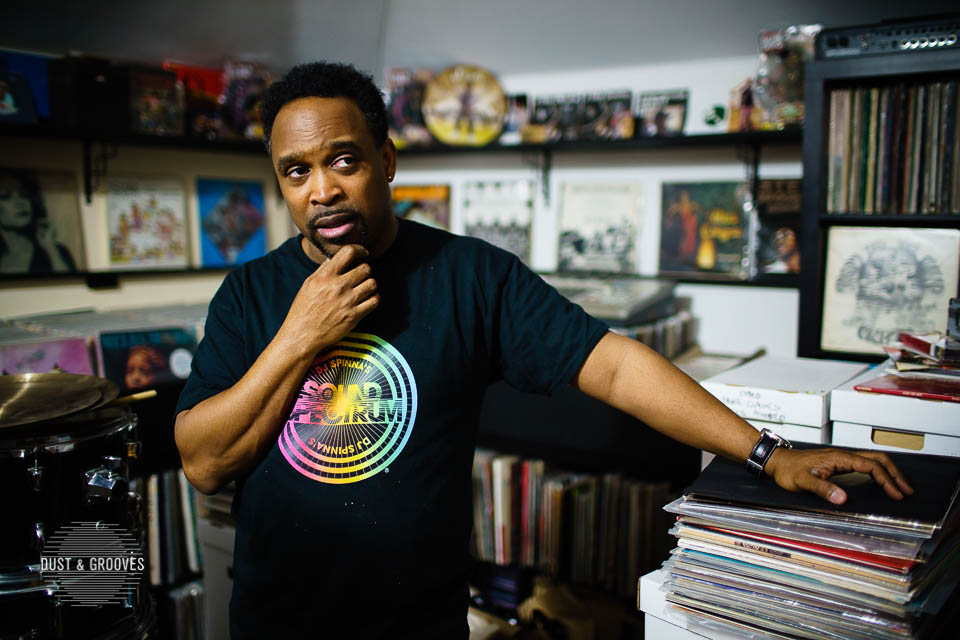
Was that your first time being in a predominantly gay setting?
Yes, but I didn’t see anything too shocking. The crowd was mixed. It was gay but it wasn’t nothing but men. There were women there as well. I think the Garage started off more strictly gay than how it ended up. And I know a lot of the old Garage members detested this because I hear them talk about it often. And hip-hop kind of infiltrated in the later years. Because there weren’t many clubs left. Hip-hop had gotten a really bad rep in New York because of all the crazy stuff that used to happen and people were looking for somewhere to go. So there were some hip-hop cats who were mainly dancers who wanted to party, and have a club to go to. So you did see gold rope chains in the club. But for me it was always about the music.
When did you start making beats?
Ok, so the first time I ever went into a recording studio and made a beat was in 1985. And I was part of several hip-hop groups growing up. Trying to get on, trying to get a record deal…making demos. I was even rapping at one point. I was emceeing at one point.
Did you have a name before Spinna?
I had a name before Spinna. I might run into a record in here with my old name tagged on it.
This is my original “I Can’t Live Without My Radio” doubles. So, my name used to be DJ Dynomite. And I also used to tag “TNT” on my records as a side note. So these records have “TNT” tagged on them. A lot of practicing. You can look at the grooves and see where I was, the “rock the beat with your hands” part of the record.
Those are the widest cut stickers I’ve ever seen.
That was the thing to do back then though.
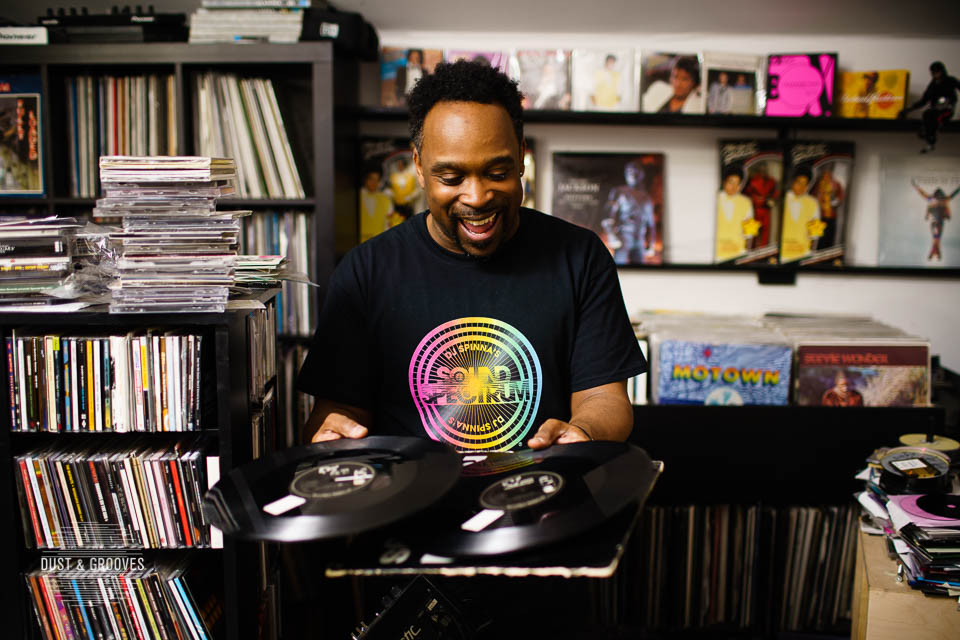 LL Cool J, “I Can’t Live Without My Radio” – I practiced a lot on this record after coming home from high school.
LL Cool J, “I Can’t Live Without My Radio” – I practiced a lot on this record after coming home from high school.
When you were emceeing did you go by Dynomite or did you have another name?
Nah, it was Dynomite. Dyno-Mite with a dash.
[He holds up Whistle, “(Nothing Serious) Just Buggin”]
This is another record I used to cut up like crazy. Thanks to Jazzy Jeff.
Also, I’ve been buying house records for as long as I’ve been buying hip-hop, for the most part. And I have a lot of early house with Dyno-Mite tagged on it. Stamped as well. Gotta let people know.
And I have cassettes that I’ve been meaning to digitize. My very first house mixtape that I ever made. This is from, I want to say, ’86, ’87. Also, I used to make practice tapes. And I had another name before Dyno-Mite.
What was that?
Vincekee (pronounced, Vin-ski).
When I first started learning how to DJ, just practice tapes, I used to record them, and this is number one. I wish I had the year on here, but this is ’83.
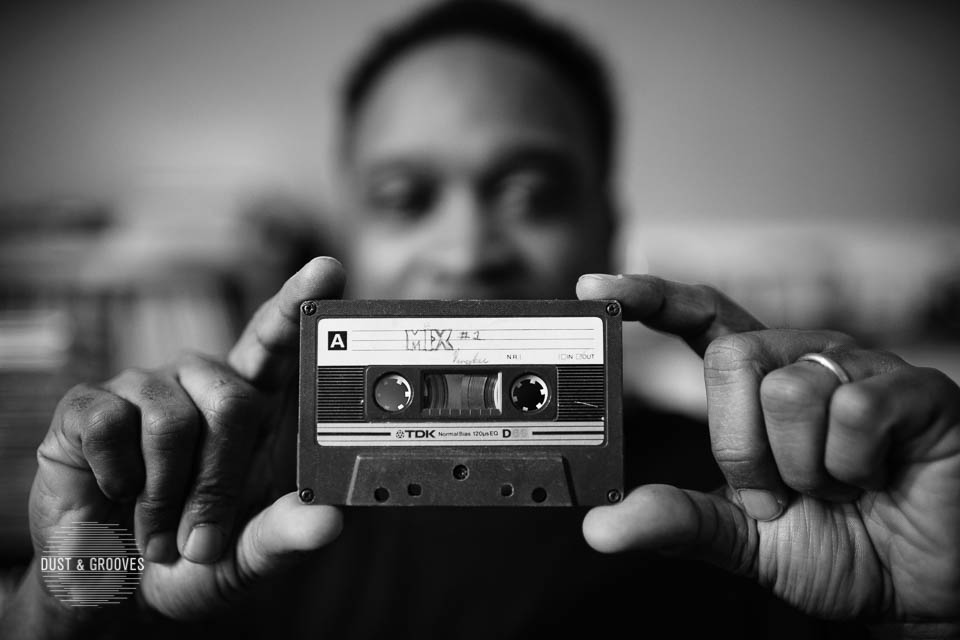 First practice tape, ever. As Vinski.
First practice tape, ever. As Vinski.
This is your very first practice tape ever?
Ever.
What does it say on the other side? Brainiac?
Yeah, that’s another name. But we’ll keep that off the record. [laughs] I was fishing. Well, actually, I’m gonna show this because I got Vincekee right under it. And I have a box over there too if you want to listen to it. Just a snippet.
This Twilight 22, “Electric Kingdom” says Dyno-Mite and it’s also dope to show an electro hip-hop record from LA. Everyone that knows me from back then, they’re gonna be hysterical when they see this. [laughs] This is hilarious.
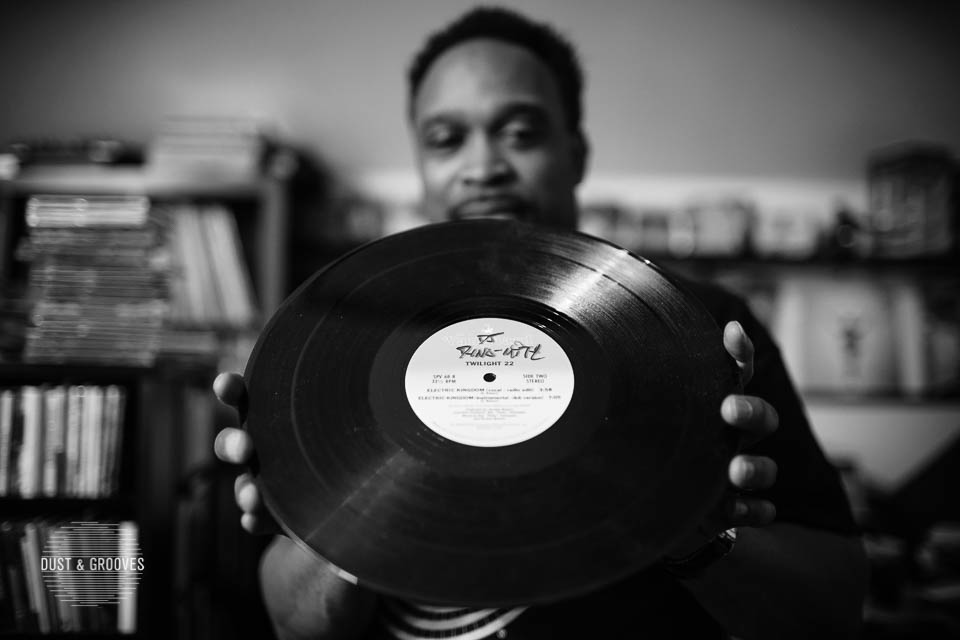
Twilight 22, Electric Kingdom (w “DJ Dyno-mite” tag). One of my early DJ names.
Is this the first exposé of the Braniac, Vincekee, Dyno-Mite evolution?
I mentioned it in an interview recently, but I haven’t shown anything before.
The name change to DJ Spinna, by the way, was officially in 1990.
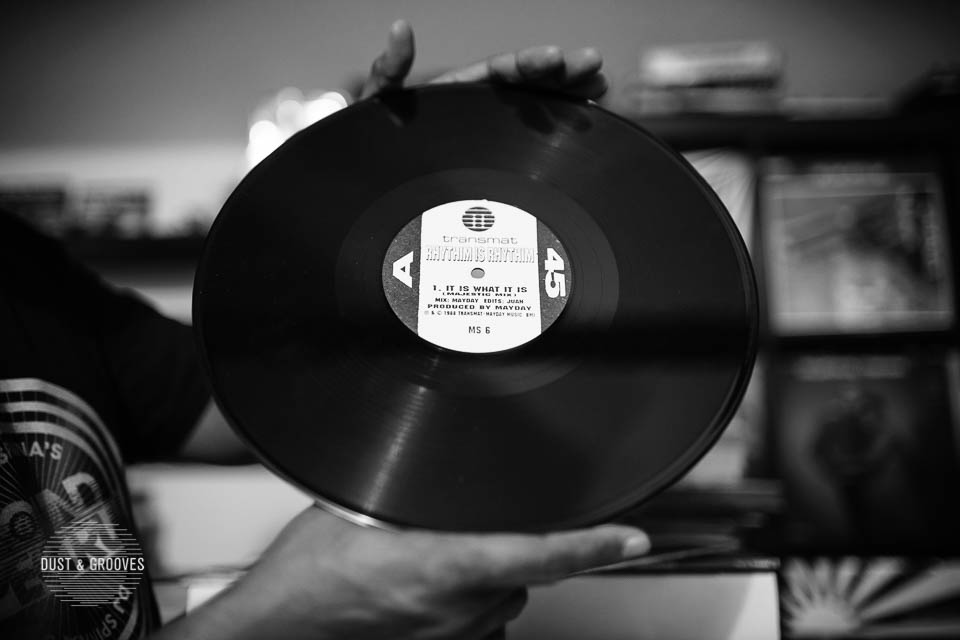 Rhythim Is Rhythim, It Is What It Is. First techno record I ever bought.
Rhythim Is Rhythim, It Is What It Is. First techno record I ever bought.
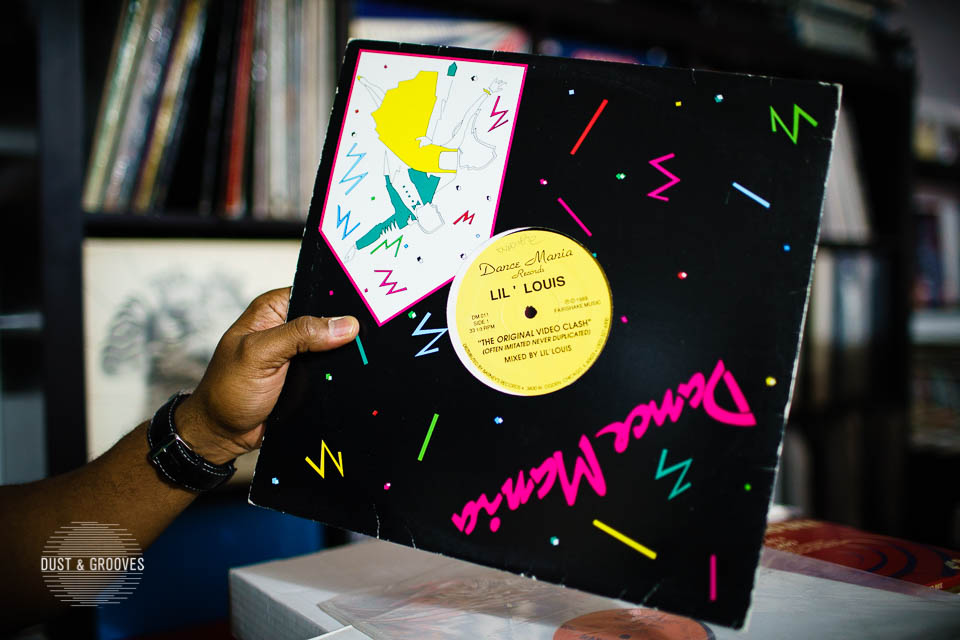 Lil’ Louis, “The Original Video Clash” – I heard Junior Vasquez crush this at Sound Factory. It’s a bullet.
Lil’ Louis, “The Original Video Clash” – I heard Junior Vasquez crush this at Sound Factory. It’s a bullet.
Love that record.
It’s a bullet.
Do you remember the first records that you sampled?
Well, I was making beats before sampling. But when it came down to sampling, wow, you’re talking early ‘90s. ’90, ’91. I think one of them might be here. Cannonball Adderly, Love, Sex, And The Zodiac. Should I pull it out?
You know what’s crazy? I sampled a lot of records early that people wound up sampling later on, making more noise and bigger records with. I always felt like I was ahead…
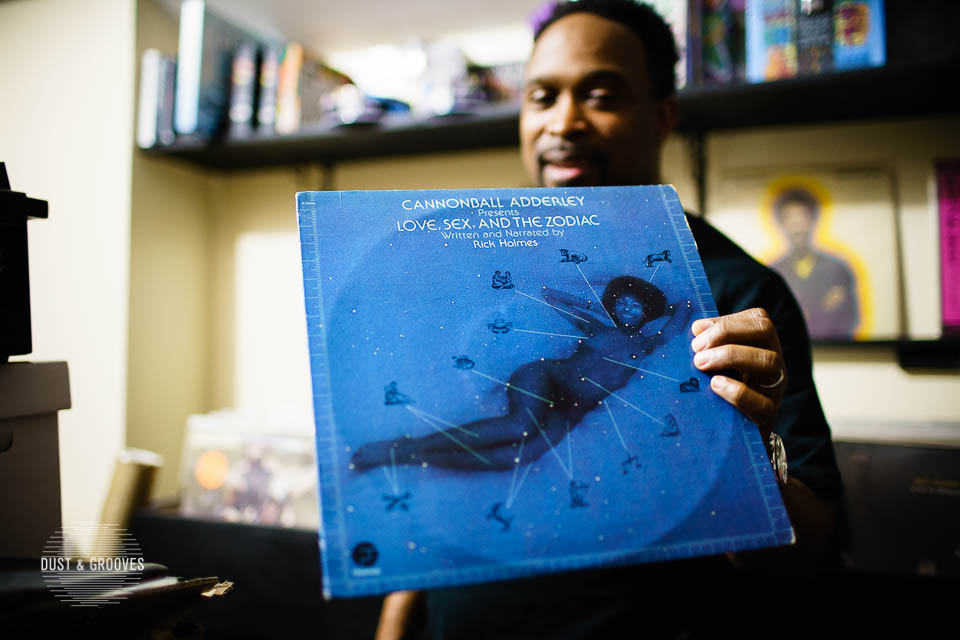 Cannonball Adderley, Love, Sex, And The Zodiac. – Jigmastas recorded a demo to this called the “Wickedness of Jiggyness,” but we never put it out. And I’m rhyming on it.
Cannonball Adderley, Love, Sex, And The Zodiac. – Jigmastas recorded a demo to this called the “Wickedness of Jiggyness,” but we never put it out. And I’m rhyming on it.
Was it a seamless transition or was there a moment when you realized that you weren’t just buying records to rock parties, that you were actually collecting?
That’s a good question. Well, considering that my dad had great records, and my uncle—my dad’s youngest brother, who passed away in 2014, a few months after my dad—had a pretty dope record collection, which I now have. He used to tape the shrink to the cover. I learned a lot about music from his collection. My dad had some, but my uncle’s was way bigger. A lot of soul, disco, funk and Caribbean music I grew up on next to him. And I used to play his records at family gatherings. Birthday parties, Thanksgiving, Christmas. I would be the five-year-old kid playing his records. I actually used to take them as a kid. He used to get mad at me when I would sneak records out of the house. So I would say I’ve been collecting records all my life. And I’ve had an appreciation for music in general all my life. So I think the collecting part of it has always been there.
I just think maybe my taste has matured.
Records I definitely wouldn’t have been checking for in the early ‘90s, I love now. My dad had so much northern soul stuff that got ruined, damaged; he got rid of them over the years. And I wish I had them now because there were probably a lot of gems in that collection.
I just didn’t care about it back in those days because I was more focused on DJing and sampling. That was really the main thing. But I think the maturity level for buying music started getting much more intense by the mid ‘90s. A record like Eugene McDaniels, for example. Great samples, but when you listen to the whole thing from beginning to end…
It’s a political record. It’s a social empowerment record. There’s so many messages in that album. That’s a good example of a record that serves more of a purpose than just for samples. It’s a great record. He was a great songwriter. He wrote “Feel Like Makin’ Love” for Roberta Flack. He was a powerful songwriter.
And in hip-hop, even though I stopped rhyming, I was working with Krim and a whole bunch of underground emcees. When you’re looking for records to sample, a lot of times the mood of the samples would dictate what the song would be about. Or there might be a song title or a lyric in the sample that helps to construct what the hip-hop record would become. A lot of times we would just vibe out and listen to a record and say that it would be dope if we came up with a song based on the mood of that sample. So it all kind of goes hand in hand, the process of listening to records and coming up with song ideas.
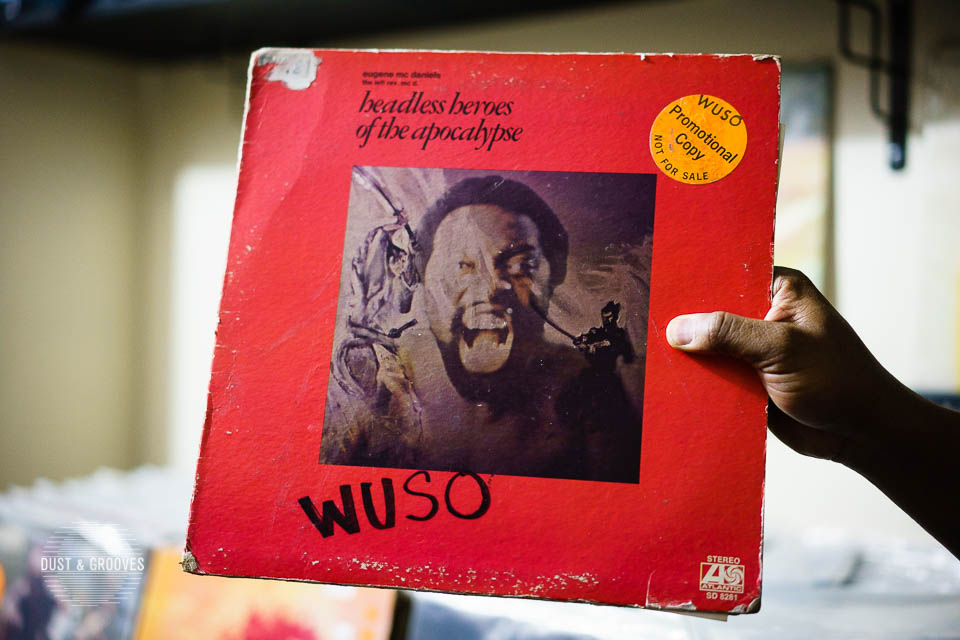 Eugene McDaniels, Headless Heroes of the Apocalypse – Powerful songwriter. I caught this for $4 in Binghamton.
Eugene McDaniels, Headless Heroes of the Apocalypse – Powerful songwriter. I caught this for $4 in Binghamton.
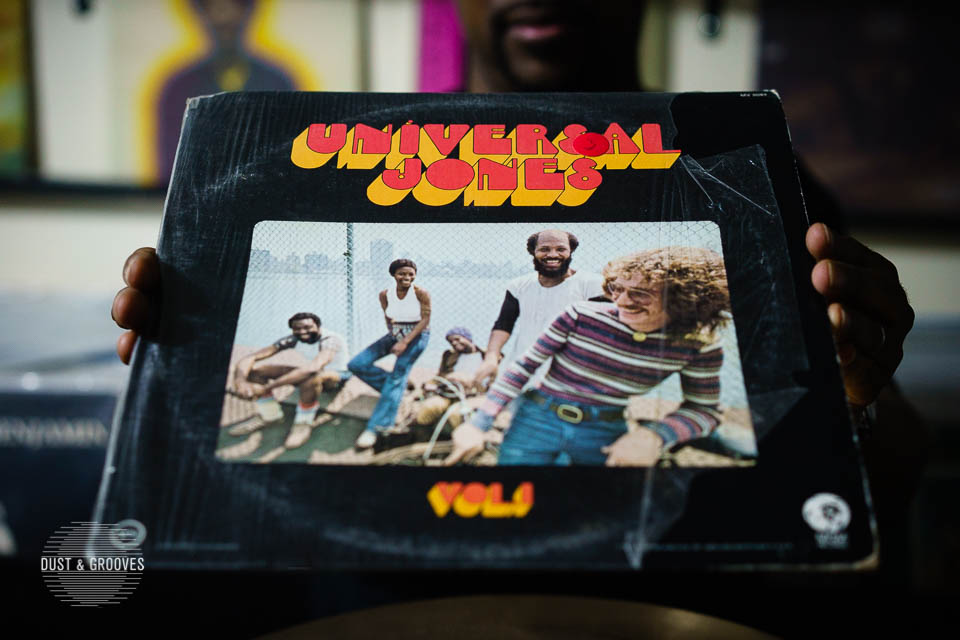 Universal Jones, Vol. 1 – Another sleeper Eugene McDaniels album which features a song called “Hello To The Wind” which is also on Bobby Hutcherson’s Now!
Universal Jones, Vol. 1 – Another sleeper Eugene McDaniels album which features a song called “Hello To The Wind” which is also on Bobby Hutcherson’s Now!
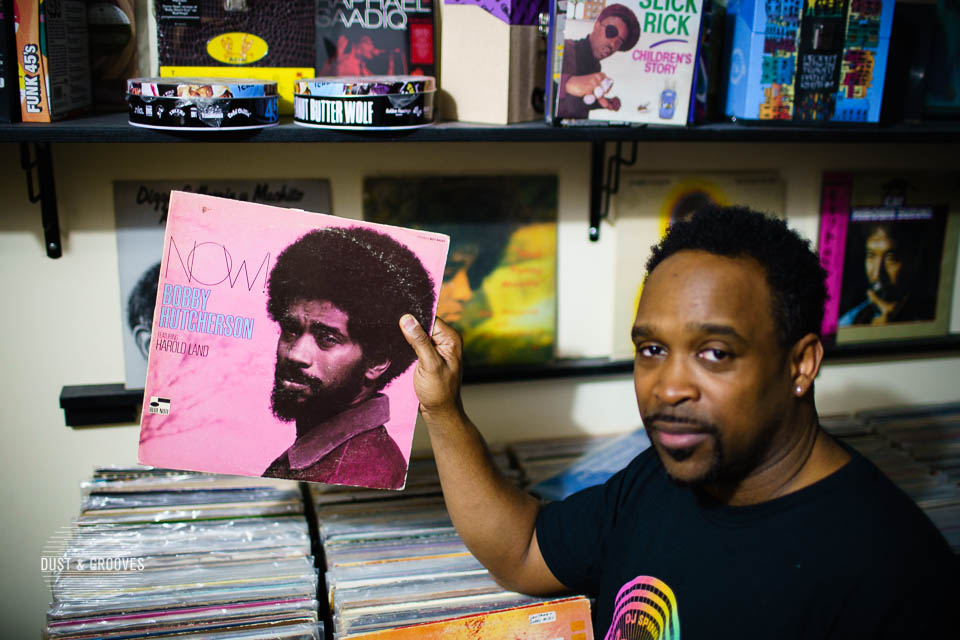 Bobby Hutcherson, Now! – My favorite Bobby Hutcherson album, which features Eugene McDaniels on vocals.
Bobby Hutcherson, Now! – My favorite Bobby Hutcherson album, which features Eugene McDaniels on vocals.
A lot of times when you make a beat you don’t know what it’s going to be so you just name it after one of the samples. And then that becomes the name of the beat. And then, when someone is listening to your beat, whatever you decided to call it…
Yup.
Outside of people not being aware of your history with house and techno, what do you listen to or collect that you think would surprise people? Maybe not stuff that you play out but just stuff that you buy to listen to.
I got a lot of hard rock. New wave is not out of the ordinary. Folk is probably the closest thing to something that people probably wouldn’t think of. I just bought a dope folk reissue the other day. But there’s elements of soul in it so I don’t know how much people would be like, why does he have that? There’s definitely something weird in my collection, just trying to think of what it could be. Children’s records…Sesame Street stuff. Ambient music. Music that have no beats at all.
You know Bruce Haack? These are experimental electronic kids records. ‘69.
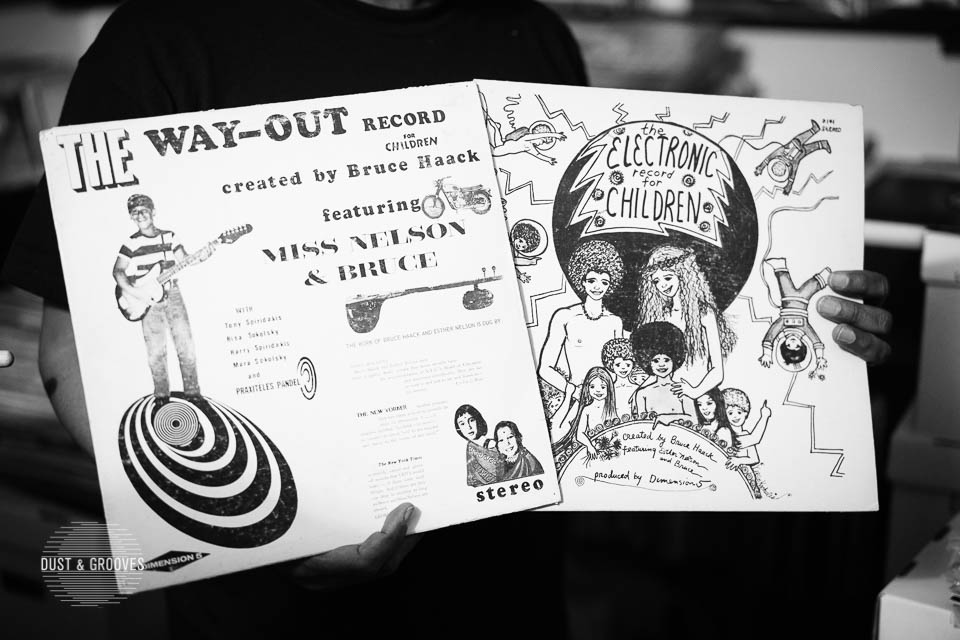 Bruce Haack, The Way-Out Record for Children & The Electronic Record for Children – I love experimental electronic records. The weirder the better.
Bruce Haack, The Way-Out Record for Children & The Electronic Record for Children – I love experimental electronic records. The weirder the better.
Are these records a beat maker thing?
I don’t know of too many people that are after them. He made later albums that have some sounds on it that J Dilla sampled. These are the earlier ones. I want to play this for you so you can hear. They’re narrated. If I was a kid listening to this, I would be spooked out. I wouldn’t want my kids listening to them.. I think people are gonna think I’m crazy. We’ve got to balance this out. I can’t just keep showing all this creepy shit [laughs].
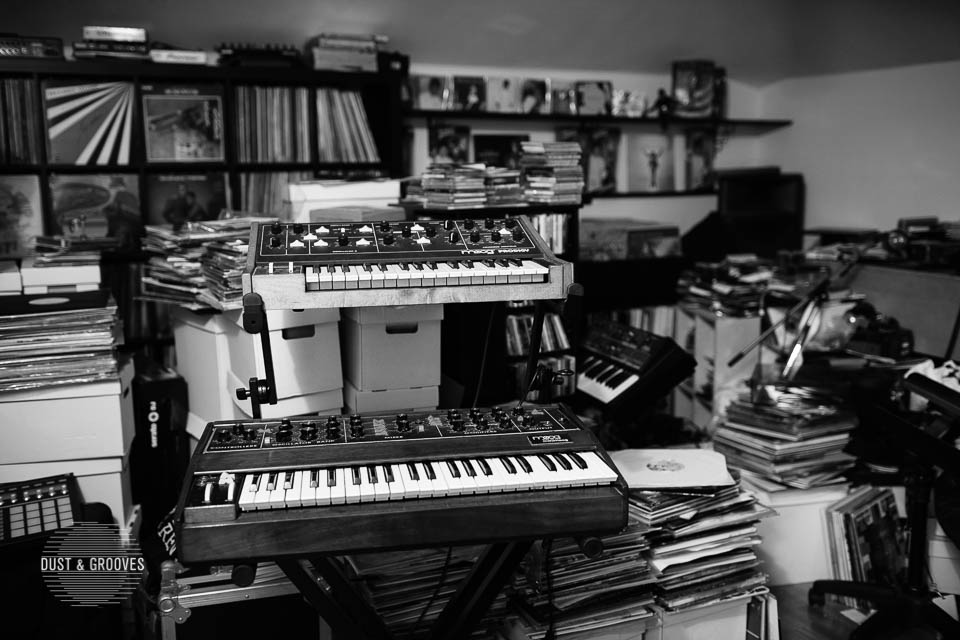
EILON: In Rich Medina’s interview we asked him about his wall of shame.
What’d he say?
EILON: Vanilla Ice.
Oh, god..
EILON: Eddie Murphy.
Everybody has Eddie Murphy records.
Are you talking about Eddie Murphy comedy records or Eddie Murphy music records?
Did you know Stevie did a joint for Eddie Murphy and it’s good?
Really?
Yes.
I only knew about Rick James.
I would say wall of shame… I don’t know…
[Pulls out a 7” of “Rubber Duckie” by Ernie]
I didn’t even pay for this. It came in a box of 45s I got from somebody. The Sesame Street Theme is on the other side. Pretty wall of shame-y [laughs].
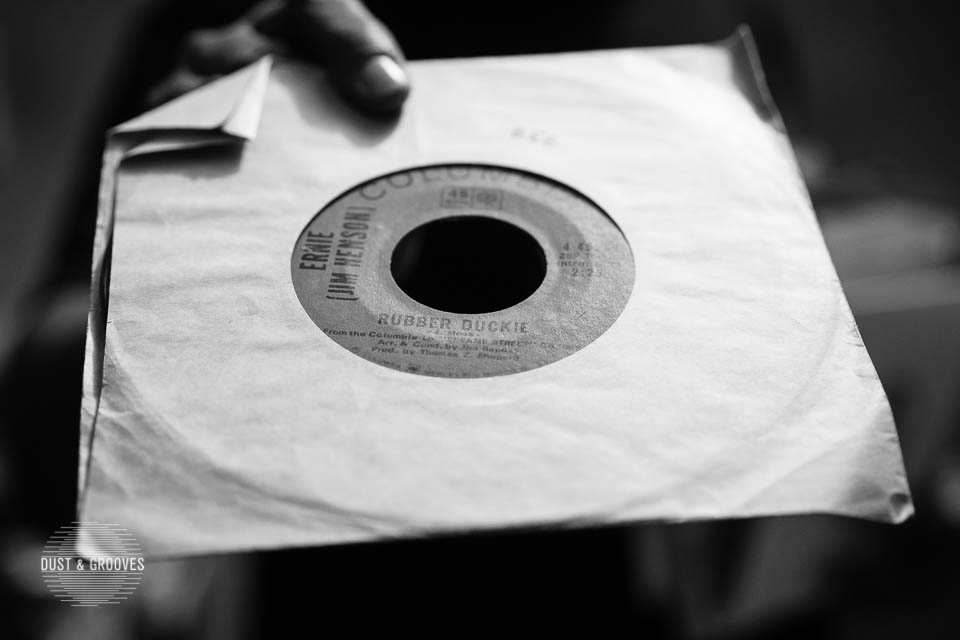
Do you collect anything besides records or music?
At one point before this digital world we’re in now, I was into collecting TV shows and ‘70s blaxploitation films and posters, but that subsided due to adult responsibilities. I have a mortgage. I have bills. And there are too many records that I want. So I had to focus. I was into sneakers too at one point. But it was not as important as vinyl, music.
Did you have a mentor at any point, either as DJ, producer or collector?
Can’t say that I had too many mentors. There was one brother who mentored me. He educated me on house. But he was also an amazing scratch DJ. He helped me to develop some technical skills on the production side too because he had a drum machine. Out in Coney Island. My old-school homeboy VLD, Grandmaster Vic, Puerto Rican brother. I used to spend a lot of time in Coney Island. My Coney Island crew, they were actually some of the guys going to the Garage when I was young and I used to get upset. Because we would hang out all day but they were older than me. And I’d be like, “Where ya goin’?” And they’d be like, “Shorty, you can’t go. You’re too young.” And I’d be so pissed off. But that’s the crew Vic hung out with. So he had a lot of those early house records. I used to make mixtapes at his crib with his records, which I would later find for myself. I got a lot of my education from him.
And then my man Charles Moore, who lived on my block, he had the sound system Lazer Rock Crew. He stopped DJing. He actually started throwing parties in the ‘90s at the Bridge Street Loft. Downtown Brooklyn on Bridge Street. Around that time, he had given me the rest of his records. Whatever he had left over from his block party days.
But no one actually taught me how to DJ. I never had anyone to say, “This is the cue button, this is the crossfader, these are the functions.” None of that. I was totally self taught on that. I just learned from watching and observing.
In terms of a record digging mentor, Kenny Dope, I would say hands down, is my record sensei. I learned a lot just from hanging out with him, and going on digging trips with him. In 1998 we took a flight to Portland and stayed out there for a week just to buy records. And he pulled out a lot of stuff that I didn’t know about. His 45 collection is one of the best I’ve ever seen. Nobody has it all, and we’re all still learning. But that guy has a lot of records.
Who are some other DJs that have been influential for you?
Grandmaster Flash, Jazzy Jay, Howie Tee, DJ Scratch, Jazzy Jeff, Cash Money, those are the main ones. And Jam Master Jay. As a show DJ, he was unbelievable. On the dance side, both as a kid learning and trying to figure out how to put records together, and blending and disco mixing and what have you, definitely Larry Levan, definitely Tony Humphries. And once I started going to clubs in the late ‘80s, early ‘90s, David Morales at the Red Zone, Timmy Regisford, Tony Humphries, Louie Vega.
Also, I cannot forget Francois K, Joe Clausell and Danny Krivit because the Body & Soul parties were some of the first parties I started going to when I got back into house. I slowed down from going to house music clubs from ‘95 to about ‘97, ‘98 because there wasn’t a real scene in New York compared to what it was in the late ‘80s, early ‘90s. The Body & Soul parties reconfigured in my brain what a dance party is supposed to be. Just building a vibe from the beginning and telling a story throughout. And letting records play.
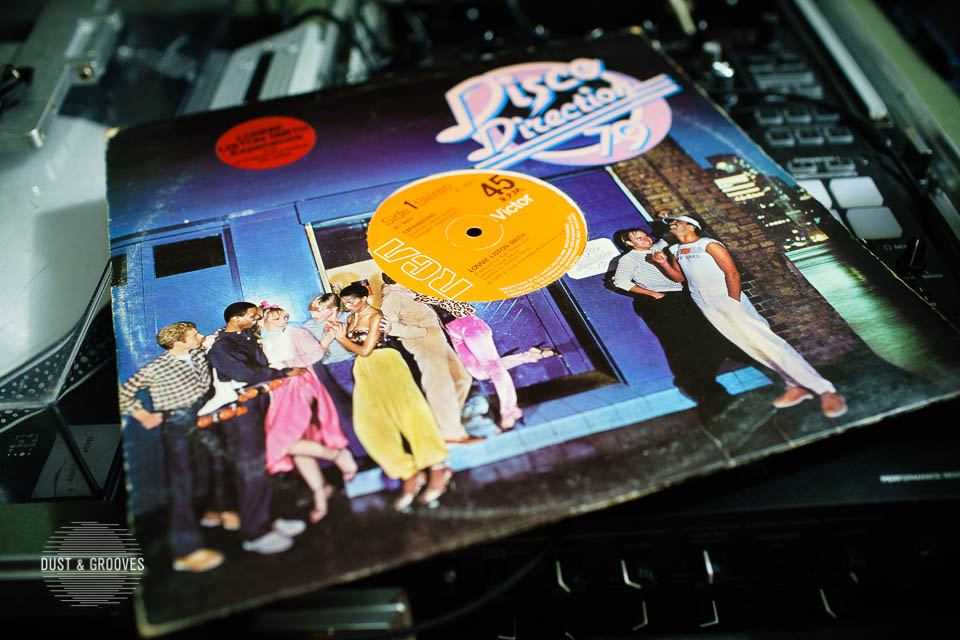 Lonnie Liston Smith, “Expansions” – I grew up on this song but hearing it played by David Mancuso at the Loft put it into a greater context.
Lonnie Liston Smith, “Expansions” – I grew up on this song but hearing it played by David Mancuso at the Loft put it into a greater context.
And David Mancuso. I didn’t get to go to the Loft as a kid in the ‘80s or ‘90s. I experienced the Loft in the 2000s. But the beauty of that is that his crowd was devoted and followed him from the beginning. So when I got there it really did feel like I may have been partying with the same kind of energy that existed fifteen, twenty years prior. It felt like a homely situation. And he’s one that doesn’t mix, so I really learned the power of the song the most from Mancuso. Having conversations with him I realized that there’s a deeper integral part to musicianship and I gained more respect for recordings. He taught me that letting records play out is the way that musicians intended to for the listener to hear the composition. I often see the power in that when I’m spinning, letting a song build up to its apex, which usually gets lost these days when djs cut tracks off too soon. Nowadays, it’s become trickier because everyone’s attention spans are short. But if you have an appreciation for music and you let these records play, sometimes you see that the reaction that happens from elongated play could be ten times more magnified than flying through twenty records in ten minutes. So I have a deep respect for Mancuso and I totally get why so many of the New York dance legends are who they are because they learned from going to his events.
Do you remember what records you heard at The Loft?
There’s a few records that Mancuso played that gave them a whole new meaning. “Love Is The Message” by MFSB, of course. I have a crazy story about that. “Expansions” by Lonnie Liston-Smith is another one. Stevie Wonder’s “As.”
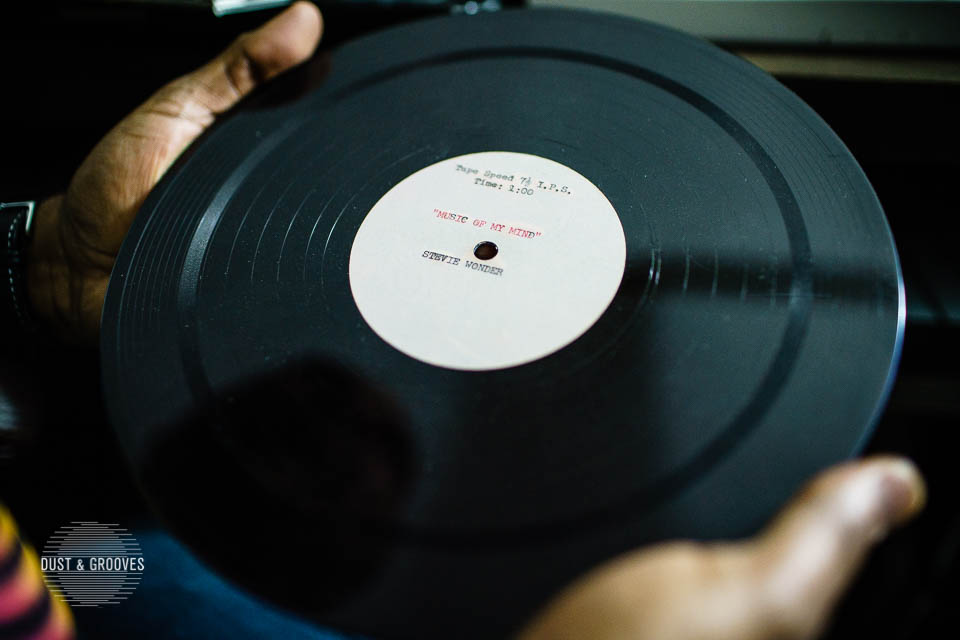 Radio ad for Stevie Wonder’s “Music Of My Mind” – (voice over) “If you enjoyed the talents of Little Stevie Wonder, now’s your chance to hear the full-sized version.” I found this on eBay back when it was just starting and had no idea what was on it until I got it. But because it was an acetate and a commercial I felt it should be mine.
Radio ad for Stevie Wonder’s “Music Of My Mind” – (voice over) “If you enjoyed the talents of Little Stevie Wonder, now’s your chance to hear the full-sized version.” I found this on eBay back when it was just starting and had no idea what was on it until I got it. But because it was an acetate and a commercial I felt it should be mine.
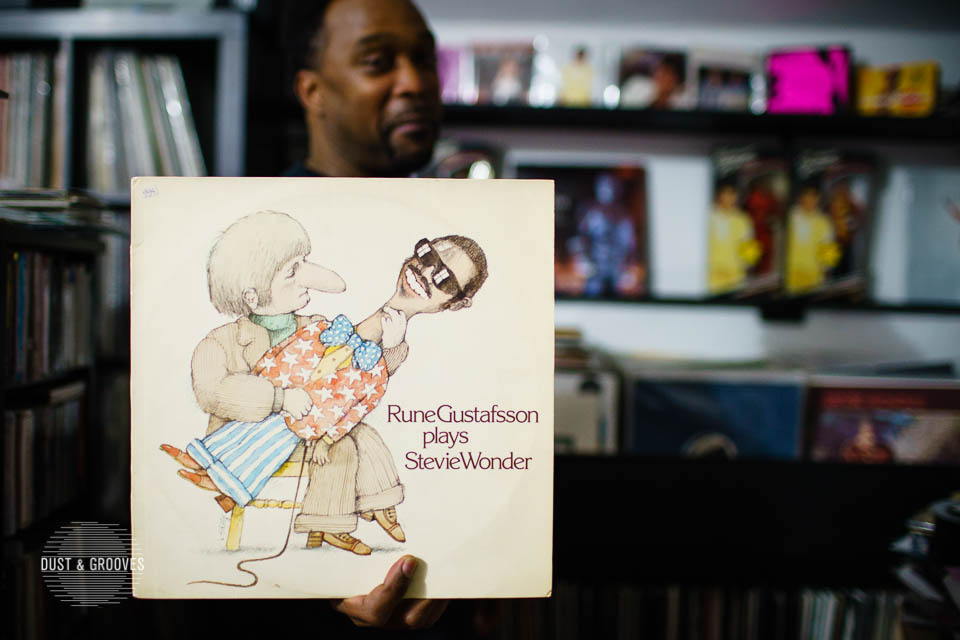 Rune Gustafsson, Plays Stevie Wonder. I picked this record up for the cover. It’s a jazz record of Stevie Wonder interpretations. The jacket is actually a little spooky if you think about it…
Rune Gustafsson, Plays Stevie Wonder. I picked this record up for the cover. It’s a jazz record of Stevie Wonder interpretations. The jacket is actually a little spooky if you think about it…
What do you mean about giving them new meaning?
Well, take “Love Is The Message.” For years, you only heard the break. Whether you heard it in a hip-hop kind of setting where they just cut the horn break and it goes into the keyboard solo, or you go to a house club or more disco-oriented party, they never play it from the beginning. Love Saves The Day is the Loft’s slogan and “Love Is The Message” was the official anthem. I went to Mancuso’s homegoing service and “Love Is The Message” was played there on a Thorens audiophile turntable positioned center stage in a shrine like setting. I realized then, and that probably was the song that defined it for me. Wow. Let the song play. Let it breathe. Let the message be told. Let that anticipation build up. You know the part where it goes “Lo-ove Is..” and then the sax solo, and it just calms and then BOOM! That’s the explosion right there! If you’re waiting for that, you can’t wait for that to come. Not to say that it doesn’t work the other way too. Every record has its purpose in the way that it’s played. But in that setting, it makes a lot of sense.
A record like “City Country City” by War, he played it from the beginning to the very end. The record is eleven minutes, or something like that. When you hear other DJs play it, they’re more focused on energy, energy, energy. They just bring it in from the break. I’ve done that. I’m guilty of that. So, again, it’s about his story line and his trajectory with music, and how he tells a story.
And he has a reverence for the original concept. It was made by an artist and it should be allowed to be expressed in its fullness. Whereas a lot of DJs are more irreverent about that idea. Like, I’ll take whatever part I want. I’m going to use it as a tool. I’m going to repurpose it.
His whole thing was if an artist goes in to record a song and produce a record, they’re not expecting the listener to cut it off. They want you to hear the whole thing. So why not play it that way.
This is a record that Mancuso used to play a lot. He put it on the map, basically. It’s a steel band disco record. From Brooklyn. Nostrand Avenue. Very local.
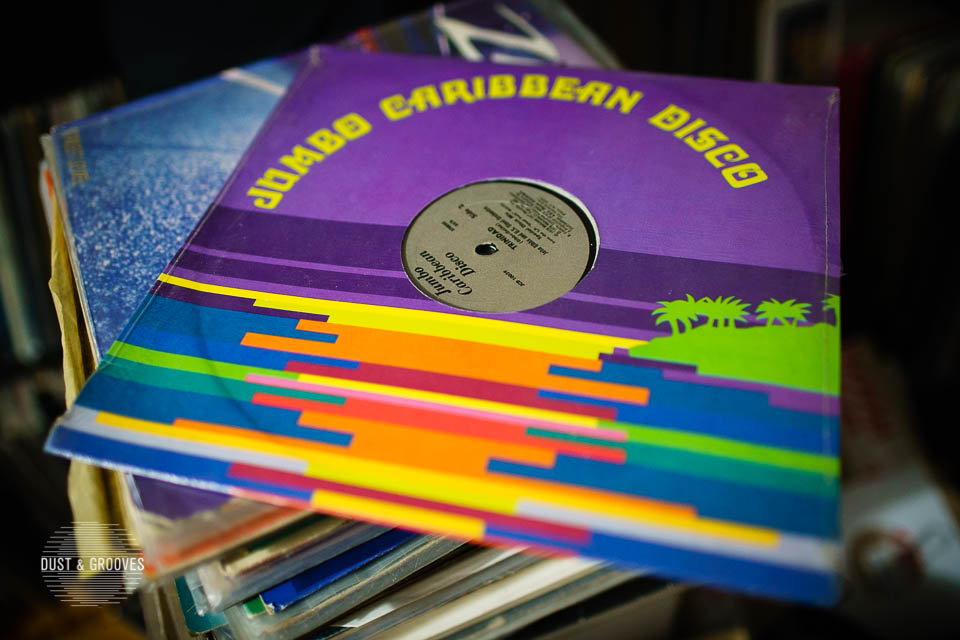 John Gibbs and U.S. Steel Orchestra, “Trinidad” – This copy is sealed!
John Gibbs and U.S. Steel Orchestra, “Trinidad” – This copy is sealed!
Had you heard that record before?
Before the Loft? Well, when I bought it I knew it was a Loft record but I hadn’t heard it in the Loft yet. But when I finally heard it in the Loft, I was like OK this all makes sense now. Now I understand.
I’m really happy about this 12-inch and the proud owner of two. That’s the obsessive collector in me. It’s the only legit way to get “As” on a 12-inch single. There are copies that have come out but this one is real, this is legit. And it sounds amazing. It’s German.
And to be honest with you, me being the Stevie Wonder buff that I am, when I saw Mancuso play “As” at the Loft, it’s another one of those situations where I felt like, man, this is powerful. I understand the power of the song now. With this crowd. Not that I didn’t understand it for me. But that crowd danced to that record when it was out. Because the Loft started like ‘69, ‘70 in his loft apartment. And he continued to do it throughout the ‘70s. So these are people that partied to this song when it was a new record. Those that are still left.
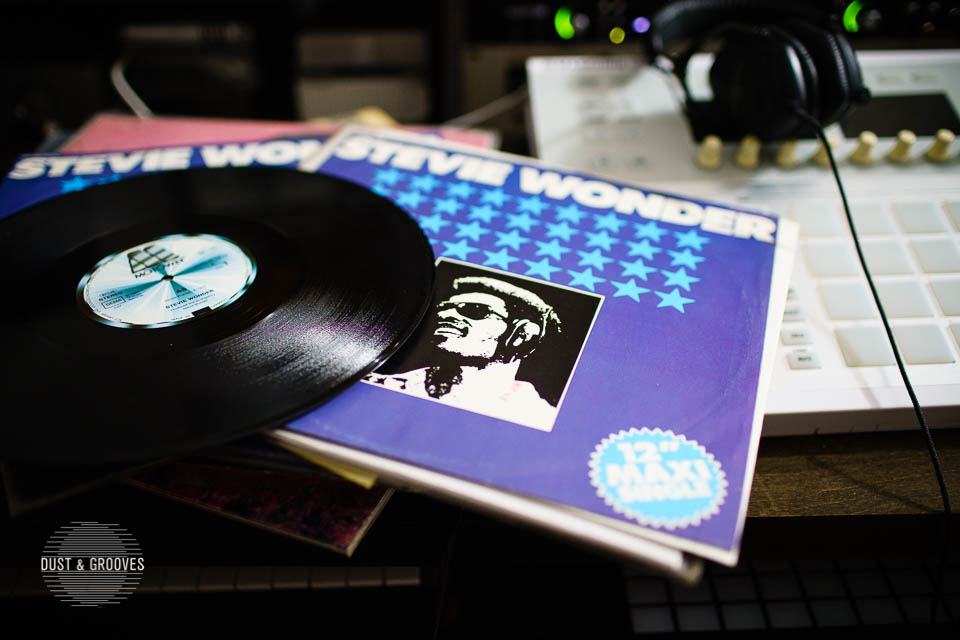 Stevie Wonder, “As” – I consider this one of my prized 12”s. It’s the only legit way to get “As” on a 12” single.
Stevie Wonder, “As” – I consider this one of my prized 12”s. It’s the only legit way to get “As” on a 12” single.
That’s kind of what ignites my fire too, to party with older people makes me get a better grasp on what those records meant back then. As opposed to a younger audience re-learning it, or learning about it in the present. It redefines the song when you’re partying amongst people that were present for it.
When I hear you say those specific records like “Love Is The Message” or “Expansions,” not only are those great records but the titles and what the lyrics are about were obviously something Mancuso was paying attention to.
That was special to the time. The thing that I come away with most with DJs from that era was using music for a purpose. If you’re excited, you play a song that brings out those emotions. Literally using music as your tool. To speak your truth or tell your story. You’re basically telling your story through music.
And I think that’s how we really get the most out of it. And that requires a lot of planning in advance. Packing records for a gig and knowing what those records could do to a crowd, you pack accordingly. You have one record that might be a downer. You have one record that might pick the energy up. You have a couple of records that might just be for leveling the playing field for a while. It’s bringing the power back to the music and the artist. That’s what I come away with, and it actually affects how I look for music too and how I dig. And of course how I DJ.
I was going to tell you a story about “Love Is The Message.” So, I was doing this Red Bull thing. I took Amtrak to DC. They told me to bring two records. The only records I had in my bag were “Love Is The Message” and a Serato control vinyl. I get off the train, I walk out, and Kenny Gamble (Philadelphia International’s prolific writer/producer of duo Gamble & Huff who wrote and produced “Love Is The Message”) is standing outside waiting for his car to pick him up.
What?! This is unrelated to Red Bull? He just happens to be standing there?
He just happened to be there. I walked up to him and introduced myself and said, I have a record in my bag I’d like you to sign. I pulled it out and he said “Wow, yeah, that’s the record that started it all.” He signed it. He signed the back.
EILON: Now you gotta find it.
I hope it’s in here. I had it on the wall at one point.
Do you think of either DJ or producer as being more dominant in your sense of yourself as an artist?
Nowadays it seems like the DJing thing is taking more precedence in my identity. Because so many people have heard me play that don’t know that I make records. Or they may discover it later. But I think I’m in people’s faces a lot more than I’m in people’s ears. Not by choice, and I would like to change that. But I’m a DJ first, and DJ is part of my name as well, so people do know me more as a DJ, and rightfully so. That’s my identity.
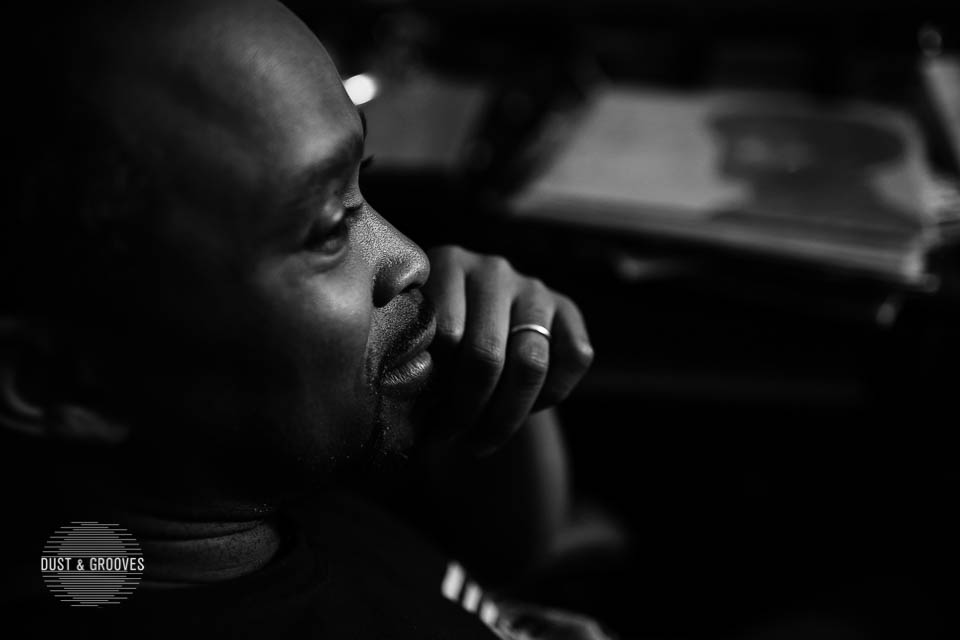
You say “nowadays.” So that’s a feeling that has fluctuated? Was there a time when you felt that producer was your primary identity?
I would say so. When I first got home from college, I made up my mind that I would never work for anyone. And I went hard on producing and making my name known in the music industry, and trying to get remix work. Underground hip-hop was such a big deal when I got in and I was so connected with artists and labels and my own group that it seemed practical for me to build a producer name that way. And I wasn’t DJing as much. The only people that really knew me as a DJ were from school or my crew. And later I would say people knew me as a hip-hop DJ more than anything, when you think about the masses, because they knew me through the records. But once I started traveling, I started going to Europe, going to Japan and expanding the musical palette beyond hip-hop, and I think that’s when things started to shift. Going to WMC (Winter Music Conference), things started to shift then.
How does it feel to have been making music and deejaying long enough where the stuff that you started out making and playing is now being discovered by a new generation? you were an intrinsic part of the community of people making that music and playing that music. And it was in the moment. And now we’re actually twenty five years down the road and a whole new generation of kids are catching on to those hip-hop records.
What’s an example of a record you’re talking about?
In general, just early ‘90s hip-hop. You must have experiences where you see twenty-year-olds who are discovering that stuff. For them, that’s like us finding the old soul records and and the names behind them. Now, they’re discovering ‘90s hip-hop records.
I think it’s a beautiful thing because that’s what they should be listening to! [laughs]
Instead of what? Let’s go on record.
Well, let’s just say that a lot of what comes out now is not true to the origins of hip-hop. Hip-hop has to evolve, yes. The music that came out in the ‘90s was an evolution from music that came out in ‘83, ‘84, or even 1980. It keeps evolving. But sometimes I feel like it’s headed for the shithole. So, if a younger audience can appreciate music from a time when we were still trying to keep it true to the essence, then I think that’s a good thing for the culture, for the artform, for the genre. Bring things back full circle, hopefully. There’s always been good hip-hop records being made, but a lot of it has gotten pushed under the radar.
Any recent hip-hop releases or new artists that are inspiring you or encouraging you about where things are heading?
Vic Spencer’s dope. Flatbush Zombies are dope. Joey Bada$$ is dope. He’s been out for a few years already though. There are more. I just can’t think of names right now.
EILON: Any sign of finding that signed copy of “Love Is The Message”?
It’s in a box.
Is that Cajmere 45 on your shelf a reissue?
You don’t know about that? Me and Kai Alcé are doing a series of reissue house 45s. 45s that were never 45s. That’s the first one. The next one is “Acid Crash.” Can we do some 45s? I collect 45s like crazy.
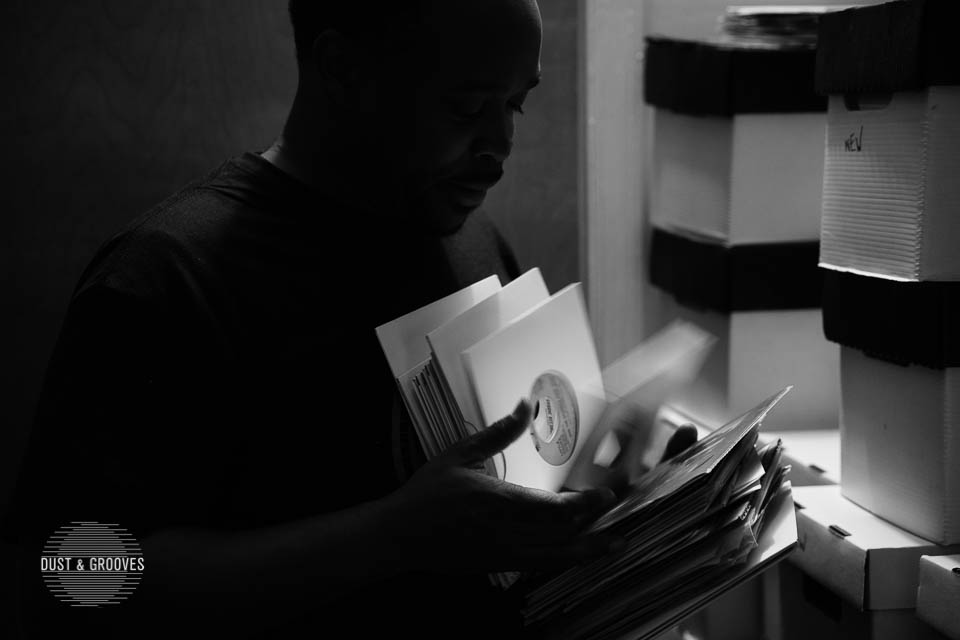
Of course. Pull out something you have a story about.
I do have something and it’s not super rare. Something happened to me yesterday as I was preparing to do the in-store. I was listening to a record and a very popular sample happened in the middle of a song and I was like, “oh shit, it only took me twenty five years to realize that.” I was just listening to it and then it came up and I was like “WHAT? Wow. Get outta here. Dr. Dre is a genius.” It’s The Fabulous Counts. [plays until the sample] Snoop! I was like, “Wow…”
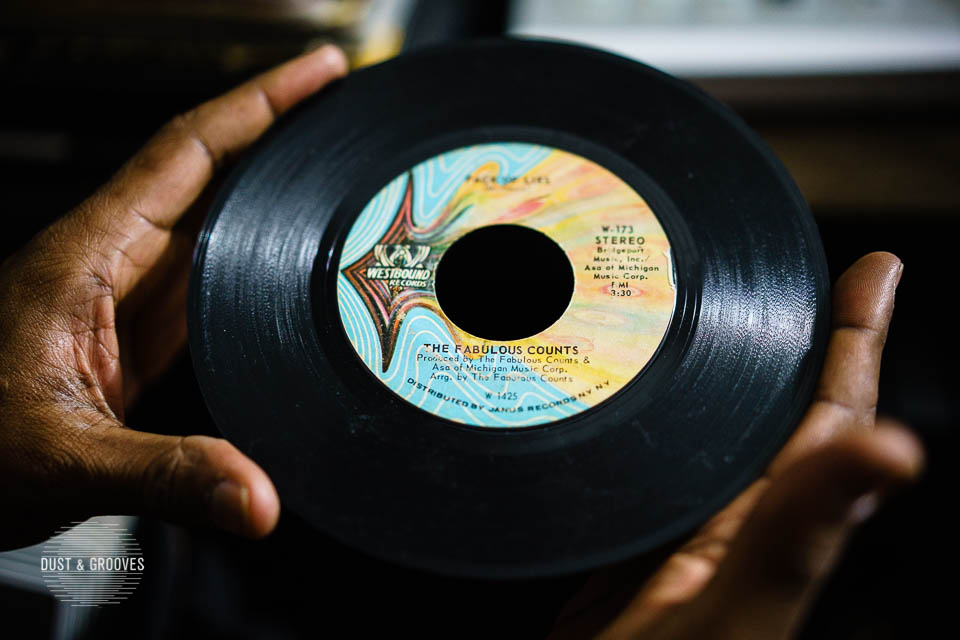 The Fabulous Counts, “Pack Of Lies” – Dr. Dre is a genius.
The Fabulous Counts, “Pack Of Lies” – Dr. Dre is a genius.
What’s another one?
Ok. A super rare one is “Get Into Your Life” by Beloyd. I got it from an old DJ from the ‘70s. He had a TV show. Like a local Soul Train kinda show. It was on local TV in Jersey or something. His name was Woody. Me and my friend Donald went to his house. He had records in storage. And I pulled out this one joint, paid 75 cents for it, and this record goes for like three hundred bucks. Got lucky.
Did you know that it was worth that at the time?
I did…
Here’s another one. Deniece Williams before she was Deniece Williams. She cut a couple of local records in Chicago on Toddlin’ Town as Deniece Chandler.
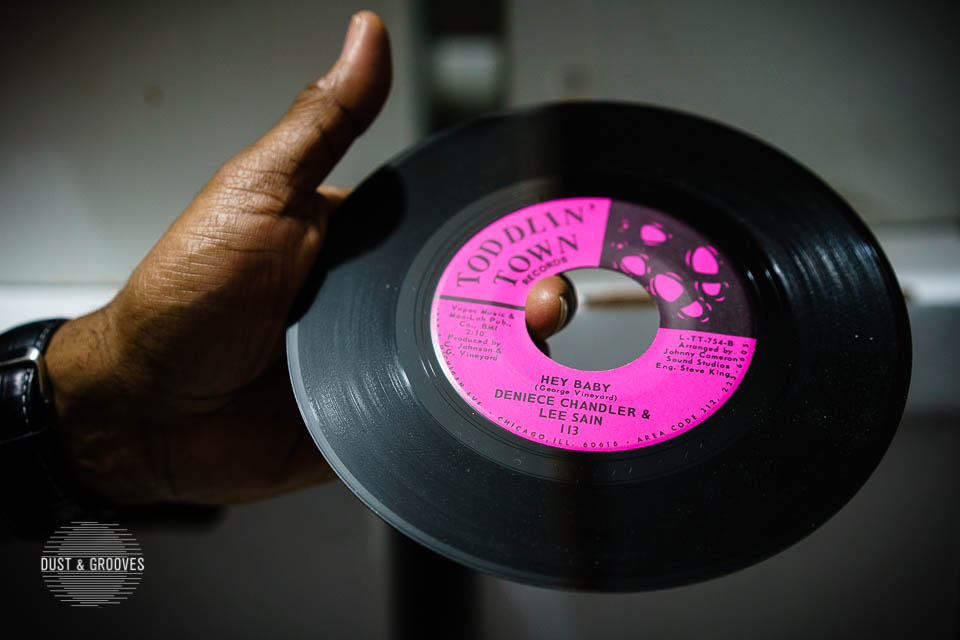
When you were a kid and went to Panama, did you come back with any Panamanian stuff?
I did but I also have family members out there that had funk 45s that I came home with. I took them. And some of them were Panamanian pressed James Brown Records. A lot of the James Brown Records actually came from Jamaica. So I have Jamaican pressed James Brown.
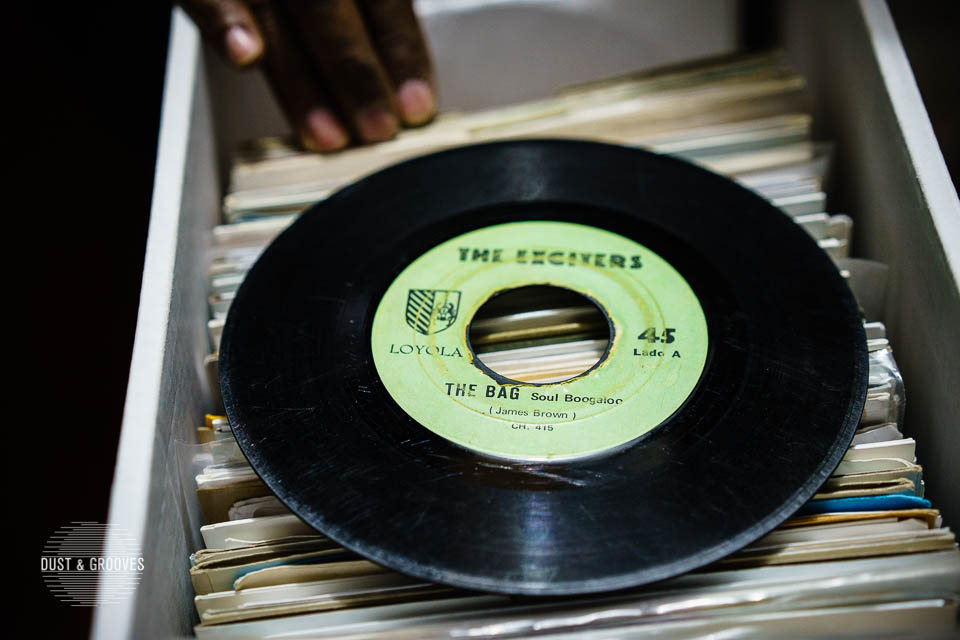 Cover version of “Papa’s Got A Brand New Bag” by Panamanian band The Exciters. I grew up with this one. Straight out of my dad’s collection.
Cover version of “Papa’s Got A Brand New Bag” by Panamanian band The Exciters. I grew up with this one. Straight out of my dad’s collection.
That Bernie Worrell record that you have over there that came out in the ‘90s. Is it any good now? I remember it being kinda corny when it came out. I bought it on cd because I knew Parliament/Funkadelic and I thought maybe there’d be samples on it.
There’s a version of “Volunteered Slavery” on it. That’s what attracted me to it the most. I remember first hearing “Volunteered Slavery.” I want to say it was on Sesame Street. Just the saxophone intro. I definitely heard it as a kid on TV. Later, I found the Rahsaan Roland Kirk, who recorded it first. I didn’t know about this album until ten years ago. I never knew Bernie Worrell recorded it. It just looked intriguing to me because it was a solo record, a later one. And when I saw that song was on it, I felt compelled to buy it to see what he did to it. I’m always reluctant to buy funk records by people who were legendary in the ‘60s/‘70s, that are making records in the ‘90s. And this album isn’t the funkiest, but I appreciate his version of the song.
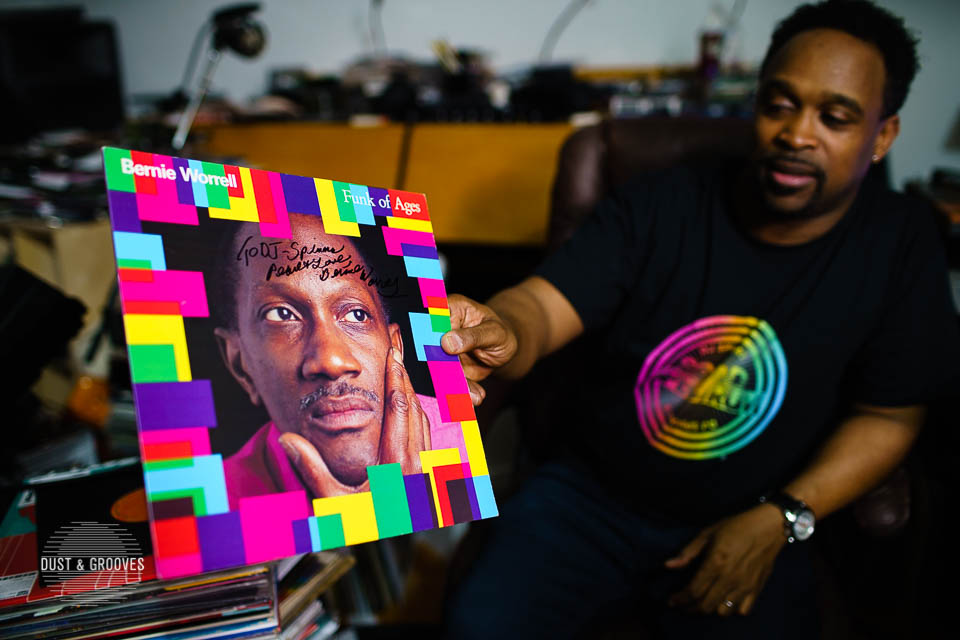 Bernie Worrell, Funk Of Ages (signed) – When I saw that Volunteered Slavery was on it, I felt compelled to buy it to see what he did to it.
Bernie Worrell, Funk Of Ages (signed) – When I saw that Volunteered Slavery was on it, I felt compelled to buy it to see what he did to it.
I’m surprised it even came out on vinyl, given the time period.
Right. It was that weird period where they were trying to kill vinyl. ’90 in particular was a really tough year for vinyl accessibility. There were so many records that were hard to get that year because the industry was trying to kill it. They were really like, vinyl is over, and they were focusing on CDs. Even a couple of hip-hop records were hard. Like, do you remember how you got Low End Theory when it came out?
I was at college then.
So was I.
I probably got it at the only Oberlin record store, Sarge’s Records, which was actually pretty good.
But what pressing was it?
Ohhh… You mean, was it a European pressing? I think it might have been, yeah. It might have an import sticker on it.
I don’t think there were US pressings. And if there were, they were promo only. They were not retail. That’s an example of what was going on.
That’s crazy if you think about it.
Years later, they did double vinyl US. But you had that on import.
But all the singles were domestic.
Yeah, but some of those were hard too. Scenario was hard in the beginning. A couple of records were like that. And they also did that thing where they squashed all those tracks onto single vinyl so a lot of those records sounded like hell. Remember that? Like, ’88 til about ‘95/’96 when they started getting smarter. They realized the DJ matters. Double vinyl, spread the grooves out. De La Soul Is Dead sounds like hell. Biz Markie, I Need A Haircut, you can’t even play it. You can’t play it. It’s low. It’s so bad.
EILON: There was an era, I think maybe in the ‘70s because of the crisis with Iran, when petrol was really expensive, and it was affecting everything.
That makes sense. Now that I think of it, styrene was a big deal during that period. A lot of records got pressed on styrene, which, it’s cheap, breakable. You can even tell styrene records by the print of the label, believe it or not. The letters, the fonts. The darkness…
Damn dude, that’s next level.
It’s nerdy. It’s definitely some nerd stuff. But you can tell. It fries easily. If you back-cue it a couple of times you get the burn. A lot of records that were pressed for promo for radio were styrene, and retail were proper vinyl.
EILON: How’re we coming on “Love Is The Message”?
What was your introduction to spiritual jazz?
I think I grew up on some spiritual jazz records without really knowing that they were that. Sun Goddess could be considered that to some degree. I can’t say anyone really introduced me to it. I would say Strata East, some of the Strata East records that I got in the late ‘90s. Between Winter In America [Gil Scott-Heron and Brian Jackson] and Billy Harper and The Sojourner [The Ensemble] Al Salaam. And my old roommate, his dad had some records and he passed them on to me. One of them was A Message from the Tribe which is super rare. On the Tribe label out of Detroit. Initially I was really going for these records as sample source material. But then when you start listening to them, you realize that there’s a sense of Afrocentricity, Black identity and spirituality, so you get a deeper connection to it. I gravitated towards jazz in general as a major part of my sample source material. So as I accumulated that stuff for my collection, I always kept a sharp eye for the more spiritual side of things just to buy to listen to, just to vibe on, and expand on. And I get pretty obsessed, so if there’s an artist or a label that I’m really into I’m trying to get all of it. [laughs] Something like Buster Williams, a record that was sampled, I don’t want to blow up anybody’s spot, by a very popular group… or the record I used for the De La Soul remix on Muse. These records all fall in that category, so I developed a taste for it.
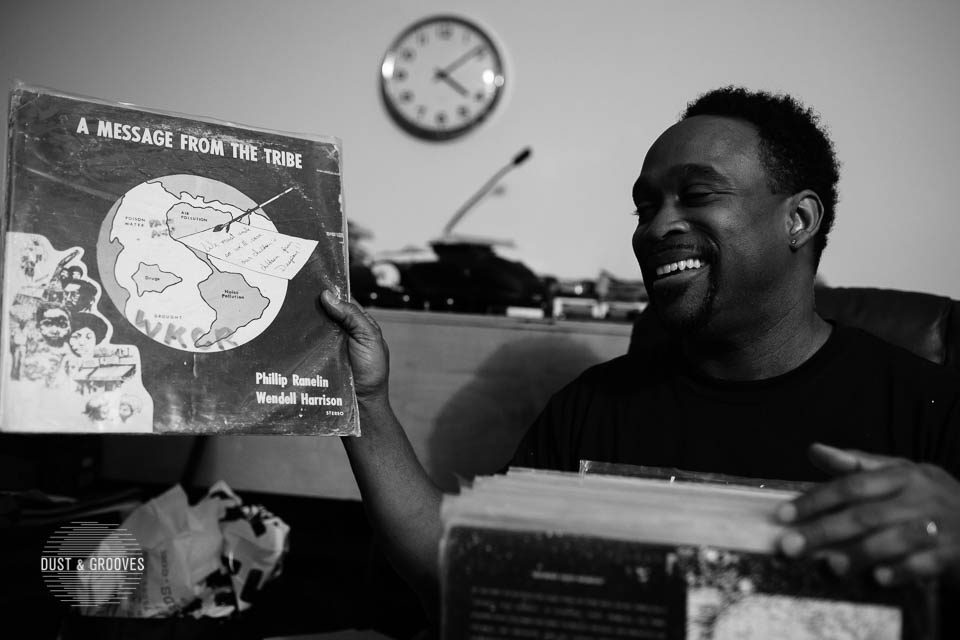 Wendell Harrison & Phillip Ranelin, A Message From The Tribe. This was given to me by an old roommate who had an amazing jazz collection.
Wendell Harrison & Phillip Ranelin, A Message From The Tribe. This was given to me by an old roommate who had an amazing jazz collection.
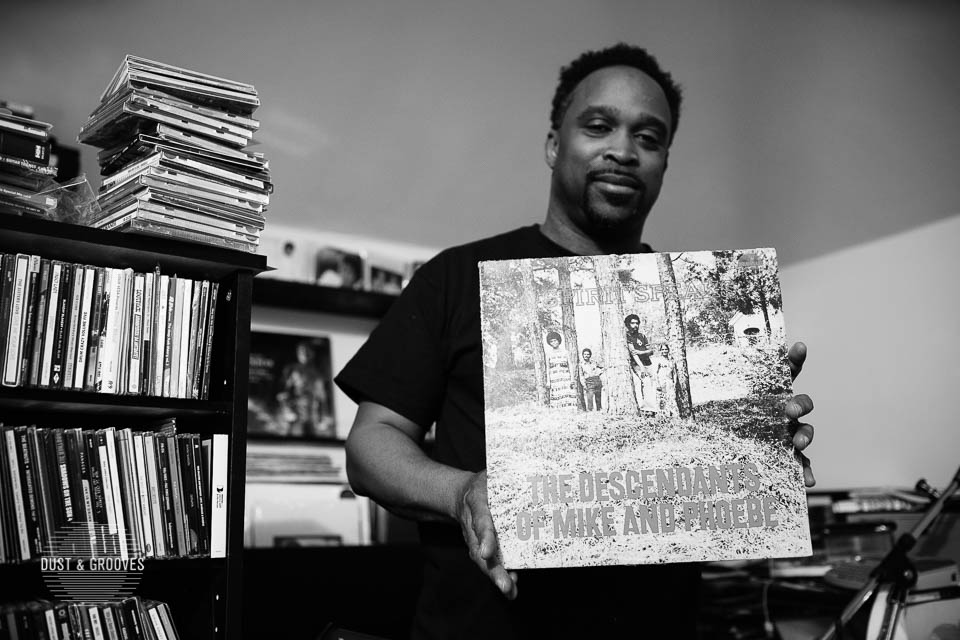 The Descendants Of Mike And Phoebe, A Spirit Speaks. Another super rare Strata East album which was recorded by members of Spike Lee’s family. Conducted by Spike’s dad, Bill Lee.
The Descendants Of Mike And Phoebe, A Spirit Speaks. Another super rare Strata East album which was recorded by members of Spike Lee’s family. Conducted by Spike’s dad, Bill Lee.
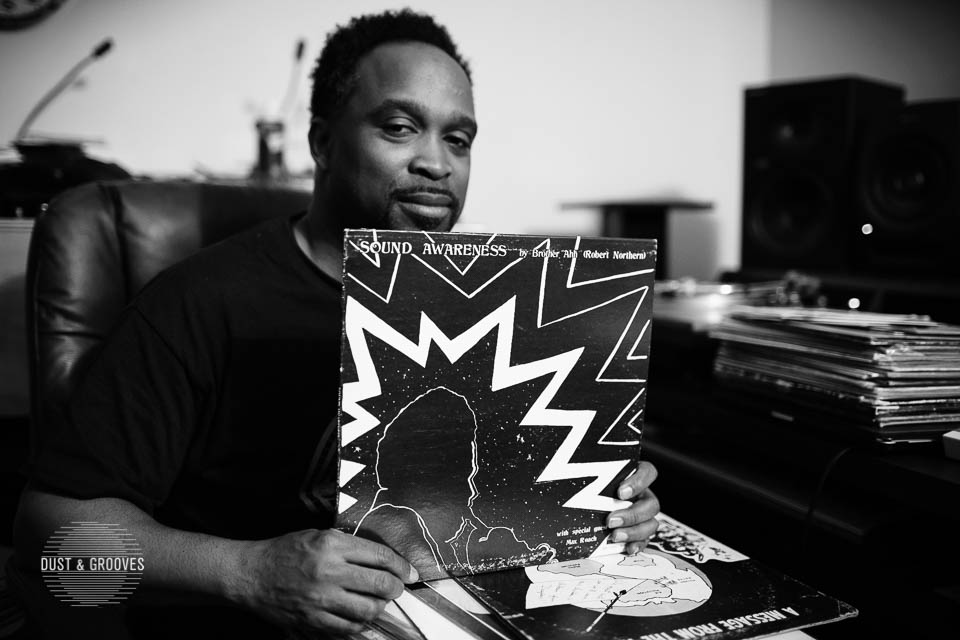 Brother Ahh, Sound Awareness – A Strata East record that took me a long time to find in good condition. I’m almost done with my Strata East want list.
Brother Ahh, Sound Awareness – A Strata East record that took me a long time to find in good condition. I’m almost done with my Strata East want list.
EILON: Remember I asked you about the scatting thing? You did this comp, Strange Games and Things. I don’t know if you noticed, but five, six or maybe even seven of the songs have that shoo be doo bop.
Yeah that’s jazz-funk. A lot of that stuff is jazz-funk.
EILON: Yeah, but I don’t know, for some reason that stood out in my mind.
Well, those songs were pre-selected by the label, by Peter from BBE. And they just basically hired me to mix it. I didn’t select any of those songs.
Peter Adarkwah is the king of scat.
[laughs] Well, that kind of music was really big in the UK, jazz-funk. The UK was the capital, London, the scene. And they grew their own legendary jazz-funk artists. Incognito, Light Of The World…and there was a lot of scatting going on.
I have to ask you a Stevie Wonder question, so here it is. Stevie Wonder is one of the most adored musicians of all time, all over the world, including by countless DJs. How did you become the Stevie Wonder guy?
Because I paid homage to him in a sincere way, for almost twenty years. And I think I caught his attention at a time where he was quite dormant. He wasn’t doing a lot of shows. There were no records out.
At the time that we started the Wonder-full party, his last studio album had been released in 1995 and we started the party 2001. It was good timing. It was just the perfect timing, and in New York City he hadn’t really been doing any shows. More importantly I think once he got to meet me and once he got to experience the party, he realized that, how can I say this…I think I can honestly say I’ve kept his name alive for a while. Not to say that people forgot about him or anything like that, but I’ve kept his legacy floating, and spreading his music and his message globally whenever he couldn’t, physically. I always see myself and this party as a conduit for what he’s already done. And allowing people to dance and celebrate his music in a different way than they would at a concert. And plus, he’s just a very giving and generous and kind person. If I was doing the same thing for other artists, it might not be the same way. But because of who he is, it just makes it a lot more special and genuine.
And I think he likes me. I honestly can say I think he likes me as a person. Actually, I know he does. We’re at a point now where we tell each other we love each other on the phone when we speak, and when we’re in person. I think that carries a lot of weight. If I was a dick, or an idiot, or some kind of jerk, I probably wouldn’t even be able to continue the party. But he’s gotten to know me as a person. And he’s big on energies. Even if I didn’t say much in his presence, he can pick up on people’s energies. It’s that sixth sense that we don’t have as people with sight. And if he doesn’t like you, he would feel it. Some people have that instinct as well with sight. You get in a room with five people and automatically there’s that one person, there’s something about him you don’t like. Just that vibe and that feeling of a person, but that sense with him is probably magnified a hundred percent. All I can say is that I’ve been blessed and I think I’ve just been fortunate. And I rally for him. I support him, I support his music, but in other ways, I’ve put out some fires that he’s not even aware of. [laughs] So it just came full circle. He understands that I appreciate him and I think he appreciates me because I appreciate him. [laughs] Let’s put it that way.
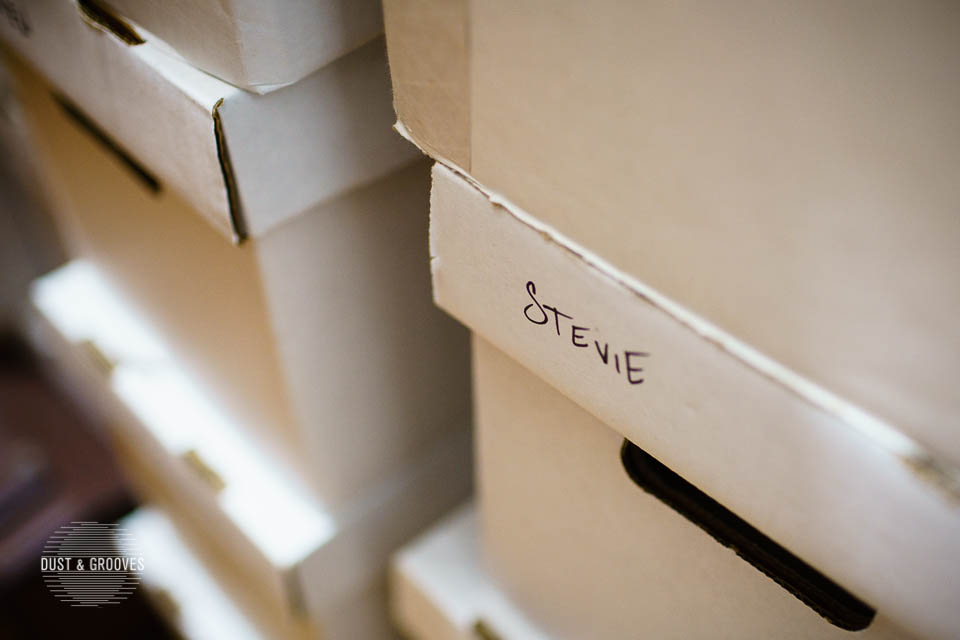 A few of many 45 boxes. This one’s just Stevie Wonder 7”s.
A few of many 45 boxes. This one’s just Stevie Wonder 7”s.
Do you think there’s something about either your personality or your history with music that makes you the perfect conduit?
Actually, I forgot to say this. One thing he told me was that he appreciates the fact that I celebrate him and I celebrate Michael and Prince the way that I do. And one thing that he said is that I’m fearless, I’m not scared to do that in that way. And I guess what he means by that is in today’s musical climate, with what people’s expectations are from DJs and parties and social gatherings, it’s quite unusual to have a party that’s a Stevie Wonder event. His catalog is not party rocking music. He may have a few records that work well in a party, like the “Do I Do” and “Another Star,” but to be able to weave his entire catalog into a musical tapestry that tells a story and entertains people. People can experience the true essence of Stevie Wonder, I think, and in his mind, and I guess for me too, it does take a lot of courage and thought to do something like that. It’s not easy. A lot of people have tried to copy it but they don’t really understand the dynamics of doing a party like that. There’s a lot of work that goes into it, beforehand and while the party is happening. If you drop “My Cheri Amour” at peak time and it comes off, there’s a reason why it comes off. It’s the time that I played the record that made it work. Everything is calculated. I play by emotion, I play by energy, but it’s still calculated, because I’m going with the room, I’m going with what the vibe is telling me, dictating me to play. And that goes for not just Michael, Prince, and Stevie, but every party that I do.
Do you have any sense that through Stevie’s getting to know you and your party that it has changed anything about his perception of DJs?
I think that I may have influenced him to become a DJ at his own shows. [laughs]
I saw that he did that.
DJ Tick Tick Boom. I did join him on stage as a DJ for a couple of Stevie Wonder concerts and I thought that would have been an ongoing thing at one point. But I think him becoming his own DJ eliminated me [laughs] to some degree where he doesn’t really need me to do that. But it’s entertaining. He has his controller set up on top of his piano and he’s deejaying at the end of his show. It’s fun. But I like to think that I may have played a role… cuz it’s like, if DJ Spinna can play my music, I can play my own music and rock the crowd. It’s all good.
How do you how do you rate Stevie Wonder as a DJ?
No comment. [laughs]
Who would you like to see next on D & G?
EILON: What about that “Love Is The Message” record?
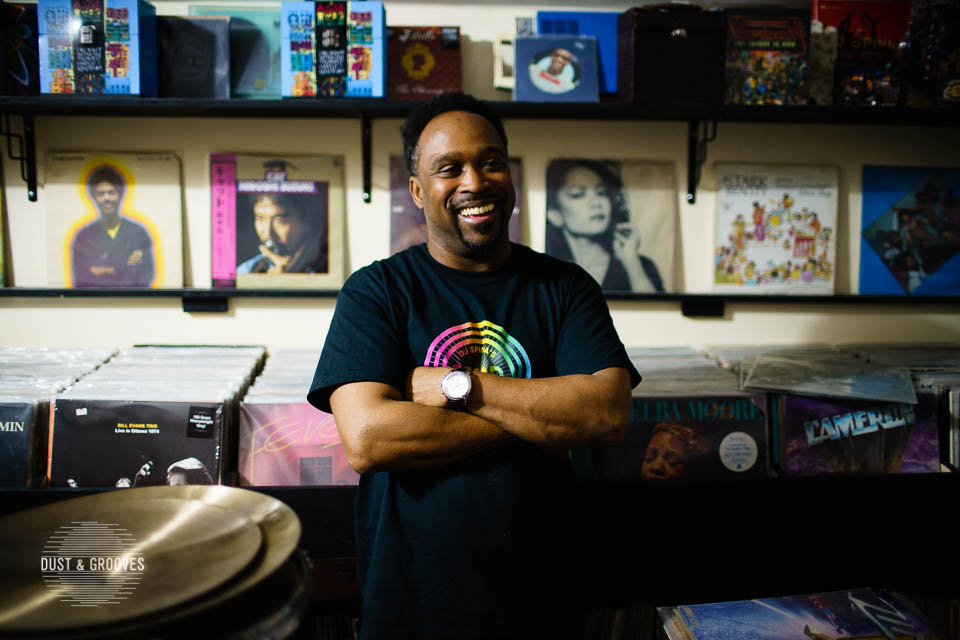
Please consider purchasing the Dust & Grooves book and continue your support of the Dust & Grooves project.

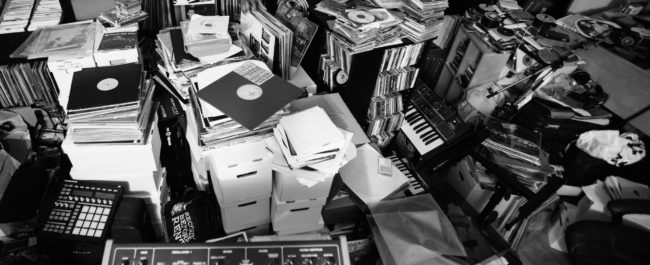

Beautiful piece about great DJ and nice guy, salute!
Big Jigmastas fan. Love your non-snob approach to collecting and sharing. The only vinyl I own is the Rocky music score by Bill Conti. I’ve had it since 1st grade. I grew up listening to my dads 45s. Motown, jazz, doowop. In a town of 700 people in the 80s 90s it was hard to hear new things. But I sought it out on vacations and school feild trips. Kids were buying candy and I was buying tapes. I try to pass that love down to my kids now. They tell me every conversation we have I turn into a song. My collection is in my head. And the list is long. I see yours is longer…and its inspiring. Thanks for staying with it and being so transparent and cool.